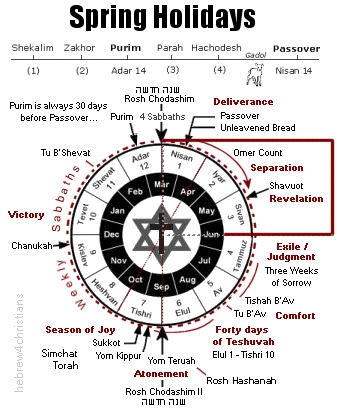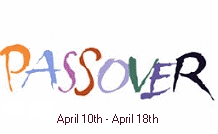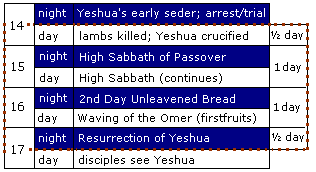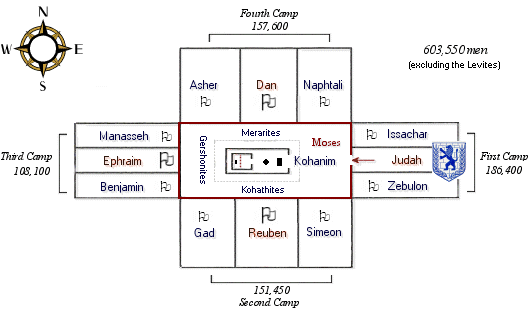|
Jewish Holiday Calendar
Note: For May 2017 site updates, please scroll past this entry....
Spring is the start of the Biblical Year and is marked by two of the Shelosh Regalim (three annual pilgrimage festivals): Pesach (Passover) and Shavuot (Pentecost). The holiday of Shavuot is held seven weeks (or fifty days) following the morning after Pesach.
The Spring Holidays:

The spring holidays provide a portrait of the death, burial, and resurrection of the Messiah: Yeshua was crucified on erev Pesach, buried during Chag Hamotzi, and was resurrected on Yom Habikkurim (Firstfruits). Shavuot (i.e., the feast of Pentecost) was the day the Ruach HaKodesh (Holy Spirit) fell on believers in fulfillment of the promise given by our Lord.
Note that in accordance with tradition, the following holiday dates begin at sundown:
- Month of Adar (Sat., Feb. 25th [eve] - Mon., March 27th [day])
- Month of Nisan (Mon. March 27th [eve] - Tues. April 25th [day])
- Month of Iyyar (Tues. April 25th [eve] - Thurs. May 25th [day])
- Month of Sivan (Thurs. May 25th [eve] - Fri. June 23rd [day])
Note: The holiday of Passover -- and particularly the Festival of Firstfruits -- will not occur near the traditional date of "Easter" or "Resurrection Sunday" as it is often called in the Gregorian calendar... For more information, see the Calendar Pages....
Dates for Passover 2017:
Free Passover Haggadah
May 2017 Updates
Note: If any page content appears to be missing, please refresh the page...
The Spirit of Truth...
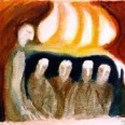
05.31.17 (Sivan 6, 5777) "The Spirit of the Lord GOD is upon me, for the LORD has anointed me to bring good news to the poor; he has sent me to bind up the brokenhearted, to proclaim liberty to the captives, and the opening of the prison to those who are bound" (Isa. 61:1). The Spirit of the Lord GOD (רוּחַ אֲדנָי יְהוִה) heralds "good news" and therefore centers on the glory of the Messiah (see John 15:26; John 16:13-14). The root meaning of the Hebrew verb basar (בָּשַׂר) is "to bring tidings, especially pertaining to military encounters," and hence both the Septuagint (and the New Testament) renders it as "εὐαγγελίσασθαι" - "to proclaim the victory [of God's redemption]." Interestingly, the word basar can also mean "meat" or "flesh," whereas besorah means "good tidings." Perhaps the connection between the two words has to do with the proclamation of a feast during times of "good news" after a significant military victory. In the New Testament, the connection between the flesh of Messiah offered in sacrifice for our sins should also be noted, especially since the "good news" concerns deliverance from the devil and the sickness of spiritual (i.e., eternal) death.
Something radically changed with the advent of the Holy Spirit, friends. Something inward, as the Torah was written upon the tablets of the heart, as it was written: "Behold, the days are coming, declares the LORD, when I will make a new covenant (בְּרִית חֲדָשָׁה) with the house of Israel and the house of Judah, not like the covenant that I made with their fathers on the day when I took them by the hand to bring them out of the land of Egypt, my covenant that they broke, though I was their husband, declares the LORD. For this is the covenant that I will make with the house of Israel after those days, declares the LORD: I will give my Torah within them (נָתַתִּי אֶת־תּוֹרָתִי בְּקִרְבָּם) and I will write it on their hearts (וְעַל־לִבָּם אֶכְתֲּבֶנָּה). And I will be their God, and they shall be my people" (Jer. 31:31-33). Note especially that this covenant would not be "like the covenant I made with the fathers" during the time of the Exodus from Egypt (i.e., Sinai), but it would be something far greater, regenerating human nature, when the truth of Torah would become part of the inner life and passion of the heart. Amen. The LORD is not only "God-with-us" but "God-within-us."
Revelation of the Torah...

05.31.17 (Sivan 6, 5777) Jewish tradition often refers to Shavuot as "mattan Torah," the time of the revelation of Torah, and while that is indeed true, I would argue that the meaning of "Torah" should not be limited to simply refer to the law code given at Sinai (i.e., the Ten Commandments and the various mishpatim (rules), chukkim (decrees), and so on), but includes the great vision of the Mishkan (Tabernacle), and with it, the sacrificial Altar, the blood of which was sprinkled over the tablets of the law located within the very heart of the Mishkan itself (i.e., the cover of the Ark of the Covenant within the "Holy of Holies"). In addition to the prescribed daily sacrifice of the lamb of God (i.e., korban tamid: קָרְבָּן תָּמִיד), the central ritual of atonement given in the Torah is that of the anointed High Priest sprinkling sacrificial blood over the tablets of the law upon the kapporet (the "mercy seat") of the Ark of the Covenant - the Place where "Love and truth meet, where righteousness and peace kiss" (Psalm 85:10). It was from the midst of the surrounding cloud in the Holy of Holies that the Voice of the LORD was heard, just as it was in the midst of the surrounding cloud of darkness upon the cross that Yeshua cried out in intercession for our sins...
The Messiah and Sinai...
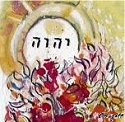
05.31.17 (Sivan 6, 5777) Regarding the revelation of Torah at Sinai, notice that God began uttering the Ten Commandments by saying, "I AM the LORD your God, who brought you out of the land of Egypt, the house of slavery" (Exod. 20:2), rather than saying, "I AM the LORD your God, Creator of heaven and earth" (Gen. 1:1). The LORD refers to himself as our Savior first, since creation is designed to demonstrate His redemptive love given through Yeshua, the One called the "Lamb slain from the foundation of the world" (Rev. 13:8; 1 Pet. 1:18-20; Eph. 1:4; 2 Tim. 1:9). "All things were created by Him (i.e., Yeshua), and for Him" and in Him all things consist (συνεστηκεν, lit. "stick together") (Col. 1:16-17). Creation therefore begins and ends with the love of God as manifested in the Person of Yeshua our Messiah, the great Lamb of God... He is the Center of Creation - the Aleph and Tav - the Beginning and the End (Isa. 44:6; Rev. 1:17). All the world was created for the Messiah: "For from him and through him and to him are all things. To him be glory forever. Amen" (Rom. 11:36).
Everyday Revelation...
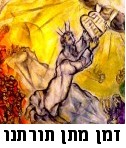
[ Today is the holiday of Shavuot (i.e., "Pentecost"); Chag Shavuot Sameach! ]
05.31.17 (Sivan 6, 5777) The sages have asked, "Why is Shavuot ("Pentecost") called 'zman mattan torateinu,' the time of the giving of our Torah, rather than 'zman kabbalat torateinu,' the time of the receiving of our Torah? The reason is that on that momentous day at Sinai, only the giving of the Torah occurred, whereas the receiving of the Torah must take place each and every day, as it says, "Trust in the LORD 'bekhol libbekha' (בְּכָל־לִבֶּךָ) - with all your heart; and know Him 'bekol derakhekha' (בְּכָל־דְּרָכֶיךָ), in all your ways" (Prov. 3:5-6). The giving of the Torah is described as a "loud and never-ending voice" (Deut. 5:19), though it is our constant responsibility to shema – to receive the invitation of God's heart.
"Trust in the LORD with all your heart... know Him in all your ways" (Prov. 3:5-6). The Hebrew word for trust is "bittachon" (בִּטָחוֹן), from a root word (בָּטָח) that means "to lean upon," to feel safe and secure.... Bittachon describes emotional acceptance of the goodness of the LORD. Some of the sages have said that while emunah (אֱמוּנָה), or "faith," represents a state of cognitive or intellectual understanding (בִּינָה) that God is involved in all the events of the universe, bittachon means emotionally trusting that the Lord is present in every situation for your good.... Rabbi Bechaya put the distinction this way: "Everyone with bittachon has emunah, but not everyone with emunah has bittachon." Bittachon is an intuitive awareness of the personal love of God for your life, coupled with complete trust that He deeply cares for you (Rom. 8:28). It is an expectation that the love of God is "I-AM-always-with-you," too.
"Know Him In all your ways," and that means whatever way you find yourself in, which of course includes the way of your struggles, your transgressions, and your heartaches, as well as the way of your deepest longing and hope...
Ten Matters of Heart...

[ The great holiday of Shavuot ("Pentecost") begins this evening at sundown... ]
05.30.17 (Sivan 5, 5777) During the holiday of Shavuot it is customary to reaffirm God's covenant with us and to renew our identity as God's children. Toward that end, and in the light of the inner meaning of Torah revealed by Yeshua our Messiah, we may summarize the Ten Commandments of Torah (עֲשֶׂרֶת הַדִבְּרוֹת) this way: 1) "I AM your only Deliverer, the One who loves and chooses you; 2) love me passionately and exclusively; 3) regard my love as sacred; 4) rest in me; 5) honor your life and its history; do no harm to others: 6) forsake anger, 7) abandon lust, 8) renounce greed, and 9) abhor lying, and 10) refuse envy. Know that you belong to me and that you are accepted. Love others as you are also loved..."
Rabbi Levi said, "When the Holy One spoke to the people of Israel, each one felt personally spoken to by God, and thus it says in the singular, 'I am the Eternal One, your God.'" Indeed the very first commandment given at Sinai was to accept the reality of our personal deliverance by the LORD: "I am the LORD your God, who brought you (singular) out of the land of Egypt, out of the house of slavery" (Exod. 20:2). In fact, God used the second person singular (not plural) for all the verbs throughout the Ten Commandments: "you (singular) shall have no other gods beside me"; "you (singular) shall not take the Name of the LORD your God in vain," and so on. The very first commandment, however, is the starting point for all that follows. Until you accept the LORD as your God and to trust Him as your own Deliverer, the rest of the commandments are not likely to be heeded.
"Now the goal of the commandment is love (τὸ δὲ τέλος τῆς παραγγελίας ἐστὶν ἀγάπη) from a pure heart and a good conscience and a sincere faith, though some people, having strayed away, have turned instead to vain talk, desiring to be teachers of the Torah but without understanding either what they are saying or the things about which they make confident assertions" (1 Tim. 1:5-7). If your understanding of Torah and the meaning of the Ten Commandments (עֲשֶׂרֶת הַדִבְּרוֹת) doesn't lead you directly to God's love, you have made a seriously wrong turn... For more on this subject, click here.
Heart of Goodness...

[ The great holiday of Shavuot ("Pentecost") begins this evening at sundown... ]
05.30.17 (Sivan 5, 5777) In the Ethics of the Fathers (Avot 2), the sages debated what was the most important attribute to become a suitable bearer of God's message on earth. One sage answered, having a good eye (ayin tovah); another said being a good neighbor, and another said being wise in one's deeds. Rabbi Elazar, however, said having a "good heart" was most important, which was agreed to be the best answer. Having a good heart is the foundation for spiritual life, but it is impossible to have such a heart apart from the miracle of the Holy Spirit. Note that the gematria of a "good heart," or lev tov (לֵב טוֹב), is 49, the number of days between Passover and the giving of the Holy Spirit at Pentecost. May God pour out His Spirit upon us so that we have the heart of Yeshua within us!
Chag Shavuot same'ach, chaverim!
Receiving the Blessing...
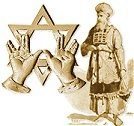
[ The following is related to this week's Torah reading, parashat Naso ("lift up!")... ]
05.30.17 (Sivan 5, 5777) The LORD spoke to Moses, saying, "Speak to Aaron and his sons, saying, 'Thus you shall bless the people of Israel, saying: "May Adonai bless you and keep you from illusions; may Adonai shine divine light upon you; may Adonai reveal his faces to you.' So shall they set my Name upon the people of Israel, and I will bless them" (Num. 6:22-27). The question is asked why the priests were needed to confer God's blessing, and what is meant by the idea of God "setting his Name" upon the people. The sages reply that the blessing is bestowed by a mediator to show that all things flow from the Holy One, and there is no one who can rightly say, "by my strength and my power alone has this come to pass" (Deut. 8:17). Therefore the blessing is graciously given to those who simply open their hearts to receive it: "May Adonai bless you; may Adonai shine divine light upon you; may Adonai reveal his faces to you..." Everything that comes to us comes in God's Name, as it is written: "Every good gift and every perfect gift is from above, coming down from the Father of Lights (אֲבִי הָאוֹרוֹת) with whom there is no variation or shadow due to change" (James 1:17). The blessing of God (בִּרְכַּת יָהּ) is to "bear His Name" by being filled with the strength of His Presence, walking in the flow of His power, completely in union with His will...
Note: For more on this subject, see "The Hebrew Priestly Blessing."
Insanity and Sin...

[ The following is related to this week's Torah reading, parashat Naso ("lift up!")... ]
05.30.17 (Sivan 5, 5777) From our Torah reading this week (i.e., parashat Naso) we read, "If any... goes astray and breaks faith..." (Num. 5:12). The sages comment that the Hebrew for "goes astray" (i.e., tisteh: תִשְׂטֶה) is written so it may also be read as "goes insane" (i.e., tishteh: תִשְׁטֶה), and concludes that sin is a form of insanity, that is, a denial of what is real, and therefore a state of delusion. We are required, of course, to believe that God is knowable (Rom. 1:19-20), that we are always in His presence (Prov. 15:3; Psalm 94:9; 139), that He knows all things (Psalm 147:5), and nothing can be hidden from Him (Isa. 40:28; Jer. 23:24; Heb. 4:13), but when we sin, we "break from" this reality and deny the divine Presence by a perverse act of self-exaltation. Whenever we imagine that we are unseen by God or whenever we "forget" that we live, move, and have our being in His presence, we are denying reality. Our sin causes us lose sight of what's real: we forget who God is; we forget who we are; and we exile ourselves from the Source of life... Surely sin is a form of insanity, and therefore we have a moral and spiritual obligation to think clearly and to value truth.
Heeding the Father's Voice...
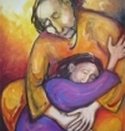
[ It was on Shavuot (i.e., "Pentecost"), after the resurrection of our Lord, when the followers of Yeshua received the comfort from the Spirit of God (see Acts 1:7-8; 2:1-4). ]
05.30.17 (Sivan 5, 5777) "Dear child of mine, do not forget my Torah (תּוֹרָתִי), but let your heart keep my commandments (מִצְוֹתַי). Doing so will add to you length of days, (ארֶךְ יָמִים), long life, and peace (שָׁלוֹם). Do not abandon the heart of Your Father by losing sight of mercy and truth (חֶסֶד וֶאֱמֶת); no! Tie them around your neck; inscribe them upon the table of your heart (לוּחַ לִבֶּךָ), that is, make them part of your inner being and will. Doing so will reveal my grace (חֵן) and good understanding (שֵׂכֶל־טוֹב) before the eyes of God and others. Trust in your heavenly Father with all your heart (בְּטַח אֶל־יְהוָה בְּכָל־לִבֶּךָ) and don't seek to be in control, trying to figure everything out on your own (וְאֶל־בִּינָתְךָ אַל־תִּשָּׁעֵן). Listen for your Father's voice in everything you do; in all your ways know His heart (בְּכָל־דְּרָכֶיךָ דָעֵהוּ), and then your ways will be directed in the truth. Don't assume that you know it all; abandon your self-conceit: Revere your heavenly Father (יְרָא יְהוָה) and flee from what you know is self-destructive and evil! Doing so will impart healing (רִפְאוּת) to you: your body will glow with health, your very bones will vibrate with life! Honor your Heavenly Father with everything you own; give him your first and the best of what you have (מֵרֵאשִׁית כָּל־תְּבוּאָתֶךָ); then your barns will burst with plenty, and your wine vats will be overflowing" (Prov. 3:1-10).
Receiving what you give...

05.30.17 (Sivan 5, 5777) From our Torah portion this week (i.e., Naso) we read: "Each one shall keep his holy donations (אִישׁ אֶת־קֳדָשָׁיו לוֹ יִהְיוּ): whatever anyone gives to the priest shall be his" (Num. 5:10). This is the spiritual principle that what we give away is what we possess, and as we measure, so will be measured back to us again (Luke 6:38). The sages comment that being selfish, acquisitive, and power-hungry are drives common among the animals, but what makes a man unique is his ability to sacrifice himself for others. Giving tzedakah, then, is an inherently spiritual act, and ultimately only that which we give to others in love will be kept as holy. As our Lord Yeshua taught us, "Be rich toward heaven," "for where your treasure is, there your heart will be also" (Luke 12:21; Matt. 6:21).
מַלְוֵה יְהוָה חוֹנֵן דָּל
וּגְמֻלוֹ יְשַׁלֶּם־לוֹ
mal·veh · Adonai · cho·nein · dal
u·ge·mu·lo · ye·sha·lem · lo

"Whoever is generous to the poor lends to the LORD,
and He will repay him for his kindness."
(Prov. 19:17)

Hebrew Study Card
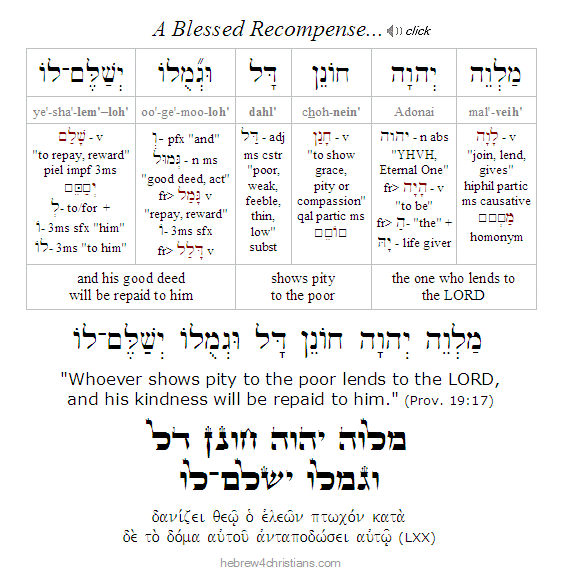
Parashat Naso - נשא

05.29.17 (Sivan 4, 5777) Our Torah portion this week (i.e., parashat Naso) includes the famous blessing that Aaron and his sons (i.e., the priests) were instructed to recite over the people of Israel: "The LORD bless you and guard you; The LORD make his face to shine upon you and be gracious to you; The LORD lift up his countenance upon you and give you peace" (Num. 6:24-26) The Hebrew text of the blessing begins with three words, is comprised of three parts, invokes the divine Name three times, and is therefore appropriately called "the three-in-one blessing." Notice that the words are spoken in the grammatical singular rather than plural because they are meant to have personal application, not to be a general benediction over a crowd of people. The phrase, "The LORD lift up His face toward you..." (יִשָּׂא יְהוָה פָּנָיו אֵלֶיךָ) pictures the beaming face of a parent as he lifts up his beloved child in joy... The repetitive construction of God "lifting up His face" (יְהוָה פָּנָיו אֵלֶיך) suggests that God's compassion now flows outward to the child in superabundant grace. Undoubtedly Yeshua recited this very blessing over his disciples when he ascended back to heaven, though of course He would have spoken it in the grammatical first person: "I will bless you and keep you (אני אברך אותך ואשמור לך); I will shine upon you and will be gracious to you; I will lift up my countenance upon you, and give you my shalom" (Luke 24:50-51).
יְבָרֶכְךָ יְהוָה וְיִשְׁמְרֶךָ
יָאֵר יְהוָה פָּנָיו אֵלֶיךָ וִיחֻנֶּךָּ
יִשָּׂא יְהוָה פָּנָיו אֵלֶיךָ וְיָשֵׂם לְךָ שָׁלוֹם
ye·va·re·khe·kha · Adonai · ve·yish·me·re·kha
ya·eir · Adonai · pa·nav · e·ley·kha · vi·chun·ne·ka
yis·sa · Adonai · pa·nav · e·ley·kha · ve·ya·sem · le·kha · sha·lom

"The LORD bless you and guard you;
The LORD make his face to shine upon you and be gracious to you;
The LORD lift up his countenance upon you and give you peace."
(Num. 6:24-26)
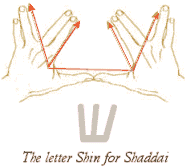
Download Study Card
Note: To learn more about this wonderful blessing, click here (you can also listen to it chanted by clicking here).
The Holiday of Shavuot...

05.29.17 (Sivan 4, 5777) Tuesday, May 30th (at sundown) marks the end of the 49 days of counting the omer, and therefore the following day is the "Jubilee" of Shavuot (i.e., "Weeks" or "Pentecost"). Recall that the Torah instructed (Lev. 23:15-16) that we count from the day following the Sabbath of Passover (i.e., Nisan 16) for exactly seven weeks, until Sivan 5 (i.e., from April 11th until May 29th this year). On the 50th day a celebration was to be observed. This annual "countdown period" recalls both the time from the Passover until the revelation at Sinai and the advent of the Spirit among Yeshua's disciples in Jerusalem (Acts 2:1-4).
 |
According to the sages, the festival of Shavuot marks the culmination of the experience of redemption, sometimes called Atzeret Pesach (עֲצֶרֶת פֶּסַח), or the "conclusion" of Passover. Since the Exodus from Egypt was intended to lead to the revelation given at Sinai, the goal of Passover was the giving of the Torah to the Jewish people. In other words, the LORD took the Israelites out of Egypt so that they would be His own treasured people, holy and separated from the pagan cultures around them, living in the light of his great revelation. Indeed, all of the holidays of the biblical calendar are connected with this event, including the fall festivals of Rosh Hashanah, Yom Kippur and Sukkot.
During this time, it is customary for young adults to recommit themselves to Talmud Torah (the study of Torah) and to renew their decision to live as Jews. In addition to formal "confirmation ceremonies" observed at synagogues, some other Shavuot customs include decorating the home and synagogue with greenery, eating dairy foods and sweets (as samples of the "milk and honey" of the promised land), and staying up the entire night of Shavuot to read selections from the Torah (this custom is called tikkun leil shavu'ot: תִּקּוּן לֵיל שָׁבוּעוֹת, "Rectification for Shavuot Night"). For the Messianic Jew, Shavuot is the time of celebrating the birth of kallat Mashiach - the "Bride of the Messiah" (i.e., the new covenant assembly), since the Ruach HaKodesh (Holy Spirit) was poured out to the believers in Yeshua during this festival (Acts 2:1-4). Let's spiritually "show up" for this time by asking God to help us walk according to the Spirit of Truth. Amen.
Memorial Day...

05.29.17 (Sivan 4, 5777) In the United States, "Memorial Day" is a national holiday observed on the last Monday of the month of May, that commemorates the sacrifice of those men and women who died in military service for their country. For those who have lost a loved one during their military service, please accept our heartfelt condolences... And may the LORD God Almighty have mercy upon all the nations of the world by imparting the revelation of His Living Torah, Yeshua, as it says, "Where there is no vision, the people cast off restraint, but the one who keeps Torah is made happy" (Prov. 29:18). If there is no vision, there is no direction, and this leads to moral and spiritual disorder, chaos, and bondage...
Resurrection and the Life...
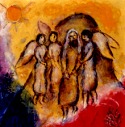
05.26.17 (Sivan 2, 5777) Despite this shadowy world of constant change, decay, heartache, and physical death, Yeshua our Master speaks in compassion: "I am the resurrection and the life. Whoever believes in me, though he die, yet shall he live, and everyone who lives and believes in me shall never die. Do you believe this?"
אֲנִי הַתְּחִיָּה וְהַחַיִּים
הַמַּאֲמִין בִּי יִחְיֶה גַּם אִם יָמוּת
וְכָל מִי שֶׁחַי וּמַאֲמִין בִּי לא־יָמוּת לְעוֹלָם
הַאִם מַאֲמִינָה אַתְּ בָּזֶה
a·ni · ha'te·chi·yah · ve'ha·chai·yim
ha·ma·a·mim · bi · yich·yeh · gam · im · ya·mut
ve'khol · mi · she'chai · u·ma·a·min · bi · lo · ya·mut · le'olam
ha·im · ma·a·mi·nah · at · ba·zeh?

"I am the resurrection and the life.
Whoever believes in me, though he die, yet shall he live,
and everyone who lives and believes in me shall never die.
Do you believe this?" (John 11:25-26)
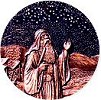
This, of course, is the ultimate question - who (or what) are you trusting for life - even in the face of physical death... You do understand that you will live forever, right? But perpetuity of conscious existence does not mean chayei olam, or everlasting life, since that is only found in relationship with the Eternal, with the Person of God... So, what are you hoping for when your hour comes? Are you looking to your own merit to secure favor in heaven? Are you hoping for a good verdict on the day of judgment? Are you looking to Moses or some other prophet to mediate on your behalf? Who are you trusting to be there for you on the other side of the veil? Who do you say that Yeshua is? (Luke 9:20)?
I am amazed that people risk the possibility of eternal life because they are afraid of venturing out in faith... But such fear is costly indeed, since to deny God is to deny yourself as a spiritual being, and the denial of the reality of the Spirit is the abandonment of your own inner life... I would rather become a fool for the hope of love than to find some cold satisfaction that love itself is nothing more than a fantasy. Better to be wrong in love than right apart from love -- for even if I am wrong in my hope, love itself needs no further vindication... Indeed every person alive makes the choice and in the end their choice will be manifest. What choice? Whether to believe the miracle of the divine love, to believe that God's power is manifest not only in the high and lofty, but in the lowly and broken, and to choose to receive God's eternal remedy given through the "foolishness" of the cross....
 |
Click for larger...
Beatitudes of Humility...
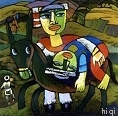
05.26.17 (Sivan 1, 5777) "Blessed are those who weep while the world goes on laughing, for theirs is the kingdom of heaven; blessed are the meek, for they shall overcome; blessed are those who realize they know little, for they shall find treasure; blessed are those who realize they are unrighteous, for they shall find healing; blessed are the misfits who are disowned by the world as fools, for they shall find mansions in heaven; blessed are the weak, for they shall be made strong; blessed are those who weep, for they shall obtain eternal consolation; blessed are those who refuse to assimilate into this world and its idols, for they shall be called victors in the world to come..."
God turns everything "upside down," for what is esteemed in this world is regarded as vanity in the world to come, and vice-versa. Indeed, the wisdom of this world is based on what I have called the "devil's logic," that is, the cynical notion that "truth" is nothing more than a political tool used to exploit others. The devil's logic is devoid of transcendental reality and therefore relies on compromise and "tolerance" to define truth as a form of "consensus" and "group think." Invariably this approach leads to ambiguity, confusion, cowardice, violence, absurdism, madness, and cruelty...
The Scriptures teach, "Light is sown for the righteous (tzaddikim), and joy for the upright (yashar) in heart" (Psalm 97:11). May it please the LORD God to renew our courage to live wholeheartedly according to His truth, and to resist the pressure to conform to the idolatry of this world. Amen. Chodesh tov and Shabbat Shalom to you all!
The Center of our Journey...

[ The following is related to our Torah reading for this week, parashat Bamidbar... The formation of the twelve tribes around the central miskhan in "cruciform" is amazing.... Chodesh Tov! ]
05.26.17 (Sivan 1, 5777) Just as the Israelites encamped in the desert around the holy Ark of the Covenant, which held the word of God and was sprinkled with sacrificial blood for atonement, so we sojourn our days focused on the Living Word of God, who offered up his own blood upon the heavenly kapporet for our eternal atonement. "For by a single offering (קָרְבָּן אֶחָד) he has perfected for all time those who are being sanctified" (Heb. 10:14). The sacrificial love of God is the central truth of reality: "For I decided to know nothing among you except Yeshua the Messiah and him crucified" (1 Cor. 2:2).
Lessons in Waste Places...

[ The following is related to our Torah reading for this week, parashat Bamidbar... ]
05.25.17 (Iyyar 29, 5777) How much energy is wasted going backward, returning to the same empty places? Yet we are creatures of habit; we tend to be lazy and we avoid examining our convictions and underlying assumptions; we are apt to ignore or explain way evidence that might challenge us, or - if we can no longer avoid the truth - we procrastinate and later "forget" the resolve to turn our heart to God in the truth. This way we can "hear" a commandment and yet postpone our action until later; we can agree to follow Messiah, but only in our own terms. Like Augustine, we pray: "Grant me chastity and continence -- only not yet..." And so we are turned back to emptiness because we refuse to go forward.
"We like to continue to believe what we have been accustomed to accept as true, and the resentment aroused when doubt is cast upon any of our assumptions leads us to seek every manner of excuse for clinging to them. The result is that most of our so-called reasoning consists in finding arguments for going on believing as we already do." - James Harvey Robinson (1863-1936)
Between bondage and the promised land lies the desert - a transitional place where we learn to depend on God's sustenance alone to bring us through... The "desert experience" can help liberate the soul from its past slavery, or it can reveal that the soul really does not want to be free. Hardship and testing reveal to us what we really believe, after all. It's one thing to be set free from what has once enslaved you, but it is quite another thing to live as a free person, conscious of your own liberty and dignity as a beloved child of God. And yet we are warned that if we don't turn away from what has enslaved us in the first place, if we don't learn to truly see ourselves as a new creation (בְּרִיאָה חֲדָשָׁה), it is likely we will be led back to a place of slavery once again.
Be encouraged, friends. If you feel lost in the desert, remember that it was there that God revealed himself to broken Moses... As it is written, "Who among you fears the LORD and obeys the voice of his servant? Let him who walks in darkness and has no light trust in the name of the LORD and rely on his God" (Isa. 50:10). Yeshua is our Good Shepherd who promises to guide our way to the high country of Zion (Psalm 23; John 10:14-16).
The Month of Sivan...
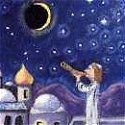
[ Today marks the start of the month of Sivan, which means that Shavuot begins in six days... ]
05.25.17 (Iyyar 29, 5777) Today is Rosh Chodesh Sivan, which means that the countdown from Passover to the climactic 50th day of Shavuot is nearly complete. The great Torah sage Moses Maimonides once wrote: "The counting from Passover to Shavuot is carried out as one who waits for the coming of the human being he loves best, counting the days and hours." If the Passover redemption is incomplete without the giving of the Torah at Sinai, how much more is redemption given by the Messiah, the true Lamb of God, incomplete without the advent of the Spirit? The cross leads to the revelation of "deeper Torah," imbued by the inward power of the Holy Spirit that quickens our hearts to long for the coming of our Beloved Savior and the establishment of his kingdom over all the earth...
Just as the giving of the Torah happened at one specified time, but the receiving of it happens all the time, "in every generation," the same may be said regarding the ruach, the Spirit: every day we must open our hearts to the Divine Presence... "I need Thee every hour." The study of Torah never ends, since we are never without need for the Teacher.
The commandment to sanctify the new moon of Sivan reveals that it is our responsibility to sanctify (i.e., observe) Biblical time in general. In other words, when we observe the month in which the Torah was revealed to Israel, we are acknowledging that time itself is rooted in the Biblical calendar with its divinely inspired cycle of festivals (i.e., the moedim). Since Rosh Chodesh Sivan historically marks the beginning of a month of great revelation, we humbly ask the LORD to help us prepare for the coming season of Shavuot:
יְהִי רָצוֹן מִלְּפָנֵיךָ יהוה אֱלהֵינוּ וֵאלהֵי אֲבוֹתֵינוּ
שֶׁתְּחַדֵּשׁ עָלֵינוּ חדֶשׁ טוֹב בַּאֲדנֵינוּ יֵשׁוּעַ הַמָּשִׁיחַ אָמֵן
ye·hi · ra·tzon · mil·fa·ne·kha · Adonai · E·lo·hei·nu · ve·lo·hei · a·vo·tei·nu
she·te·cha·desh · a·lei·nu · cho·desh · tov · ba·a·do·nei·nu · Ye·shu·a · ha·ma·shi·ach · A·men

"May it be Your will, LORD our God and God of our fathers,
that you renew for us a good month in our Lord Yeshua the Messiah. Amen."

Download Study Card
Awakening to Revelation...

05.24.17 (Iyyar 28, 5777) After making kiddush and enjoying the holiday meal on the evening of Shavuot, it is customary to stay up all night reciting various selections from Torah until sunrise. This custom is called tikkun leil shavu'ot: תִּקּוּן לֵיל שָׁבוּעוֹת, the "Rectification for Shavuot Night," and the vigil was instituted by the sages as a "remedy" for Israel's failure to be awake on the morning of the revelation (the midrash scolds the people who overslept on the morning of the revelation and who needed to be roused to salute the King). Philosophically, the theme of "wakefulness" is central to revelation, for without it we lose our consciousness as God's people. We must understand our history to order our lives according to the truth. The God of our Salvation, the Redeemer of our people, the LORD YHVH, must be distinguished from the gods of the nations; the covenant we have with God must retain its sanctity; there is a real testimony and direction to our lives. Salvation does not mean being "absorbed" into some sort of nirvana or unconsciousness, but instead focuses on concreteness, historical events, our heritage, our future, and the story of our lives…
It is important to understand that the Torah is received in words, which require a sequence of time and logic to form intelligible connections and unity of understanding. Faith comes by hearing the message of God (Rom. 10:17), not by seeing the miraculous or experiencing the "numinous." As Moses later said of the Sinai revelation, "You saw no matter of form" (Deut. 4:15) indicating priority of the inner witness of truth over outer appearance. Even the visions of the prophets held no authority until God revealed the meaning.
Shavuot is about mattan Torah, the "giving of the Torah," and therefore reminds us of our duty to "stay awake" to receive its message. Torah, as of course you know, does not mean "law" but rather "direction" or "teaching," and studying Torah therefore involves personal response, commitment, and intense focus. It is not "book learning" more than it is a type of "holy listening," heeding the story of our redemption and discovering its application and goal for our lives. Hearing the "Song" of God's Truth, is more important than the intellectual "seeing" of classical Greek tradition. Hearing is connected with time and not to timeless forms or Ideas of reality; it is dynamic and "intrudes" upon the moment to be witnessed. That is part of the reason the Sinai revelation was attended with shofar blasts and thunder: to awaken the heart to arise and the mind to hear... Torah study, then, implies a complex dialog or discourse ranging over the centuries, stretching back to the time of Moses (and through him, to Adam), through the establishment of the network of judges (Exod. 18:13-26), through the words of the prophets of Israel, all leading to the life of Yeshua the Messiah and the message he gave to his disciples... Our faith, then, is rooted and bound up with history, with the fathers and mothers who went before us, with the lives of scribes, the sages, the prophets, the apostles, including the ongoing dialog of the people of God over the millennia.
Shavuot has no specific ritual observance for us today other than to be awake to revelation, consciously remembering the truth of our heritage and holding steadfast to the promises of our ultimate healing. The very first commandment of the Ten Commandments begins: anochi Adonai Elohekha (אָנכִי יְהוָה אֱלהֶיךָ), "I am the LORD your God who brought you out of the land of Egypt" (Exod. 20:2). The very first commandment, then, is faith in the message of God's love and blessing. Torah study (understood in its broadest sense) is therefore of primary importance, because faith in its truth is the precondition of all that follows. The basic commandment of Shavuot, then, is the mitzvah that precedes all the other mitzvot.
In light of this, ask yourself whether you need to understand before you will believe... The midrash says that God offered the Torah to each of the 70 nations, but each nation first asked to understand what was required of them, and then rejected the offer... Finally God approached Israel and asked: "Will you accept my Torah?" And they replied, kol asher dibber Adonai na'aseh (כּל אֲשֶׁר־דִּבֶּר יְהוָה נַעֲשֶׂה), "all that the LORD has spoken we will do" (Exod. 19:8). In other words, Israel was willing to accept the Torah even before they understood what was required of them. Later they reaffirmed their simplicity of heart by saying na'aseh ve'nishma: "We will do and then we will understand" (Exod. 24:7). Praise the LORD God of Israel: You don't have to work to receive the light - it comes to you as you are, requiring only that you open your eyes to behold it... God is the inner radiance of reality; by his light we are able to see light (1 John 1:5; Psalm 36:9).
Anger and Idolatry...

05.24.17 (Iyyar 28, 5777) It is written in our Scriptures: "Do not be disturbed in your spirit to become angry (אַל־תְּבַהֵל בְּרוּחֲךָ לִכְעוֹס), for anger lodges in the heart of fools" (Eccl. 7:9). Even righteous zeal may be sinful, since "the wrath of man does not work the righteousness of God" (James 1:20). Indeed, being filled with anger or rage is a form of idolatry: "MY will be done..." It is a common struggle to let go of our need to be "right" all the time, but turn to God for the precious blessing of true humility... The Hebrew word for sin (i.e., chet: חֵטְא) means "missing the mark," though that essentially means missing the revelation of God's glory because anger and lesser fears consume the heart and obscure passion of the truth.
אַל־תְּבַהֵל בְּרוּחֲךָ לִכְעוֹס
כִּי כַעַס בְּחֵיק כְּסִילִים יָנוּחַ
al · te·va·hel · be·ru·cha·kha · likh·os
ki · kha·as · be·chek · ke·si·lim · ya·nu·ach

"Be not disturbed in your spirit to become angry,
for anger lodges in the heart of fools"
(Eccl. 7:9)
The sages consider sins of speech to be indicative, first of all, of the condition of the heart that marks evil and unbelief (see Luke 6:45; Matt. 12:37). Unreflective, impulsive talk is profoundly revelatory. Complaining against God's providential care of your life is a serious issue, and if left uncorrected, can lead to outright apostasy. Indeed refusing to accept life on God's terms – including your shortcomings, problems, tests, hang-ups, and other things -- is idolatry that elevates your will as supremely important. We must be very careful here. Inordinate anger is always a problem, though if it surfaces you may use it as an opportunity to examine the lies you are believing and the false assumptions you hold to be true.
A simple (and effective) antidote to anger is gratitude... Understand the sheer gratuity of your life and its manifold blessings. Meditate on Psalm 103 and contemplate on how life itself is a tremendous gift and that every day you are given is a sacred opportunity... Pray to be delivered of your anger, too. By all means do not allow it to become a settled disposition within you -- a scowl of the heart, a cynical and suspicious way of seeing everything! Ask God to soften your heart and to awaken you to his heart expressed in all things.
"There is much to drag us back, O Lord: empty pursuits, trivial pleasures, unworthy cares. There is much to frighten us away: pride that makes us reluctant to accept help; cowardice that recoils from sharing your suffering; anguish at the prospect of confessing our sins. But You are stronger than all these forces. We call you our Redeemer and Savior because you redeem us from our empty, trivial existence, you save us from our foolish fears. This is your work which you have completed and will continue to complete in us every moment." - Kierkegaard
The Promise of Zion...
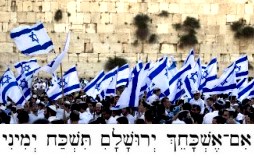
[ Today is "Jerusalem Day," a time set apart to remember the great vision of Zion... ]
05.24.17 (Iyyar 28, 5777) Jerusalem is central to the Jewish heart. When religious Jews pray three times a day, they always turn toward Jerusalem (they also keep a small section of an eastern wall in their house unplastered and unpainted (mizrach) as a sign of mourning for the destruction of the Temple). The midrash says, "As the navel is set in the center of the human body, so is the land of Israel the navel of the world; as Jerusalem is in the center of the land of Israel, so is the sanctuary in the center of Jerusalem; as the holy place is in the center of the sanctuary, and the ark is in the center of the holy place, and the foundation stone is before the holy place, so from it the world was founded" (Tanchuma, Kedoshim).
Yeshua called Jerusalem the "City of the great King" (Psalm 48:2; Matt 5:35). It is the place where He was crucified, buried, resurrected, and from whence He ascended to heaven. It is also the birthplace of kehilat Mashiach (i.e., the "church") and the focal point of humanity's eschatological future. One day (soon) Yeshua will physically return to Jerusalem as Mashiach ben David to restore the throne of King David. At that time, all the New Covenant promises given to ethnic Israel will be literally fulfilled as the Kingdom of God is manifest upon the earth. The great vision of Zion will not fail! For more, see the Yom Yerushalayim pages...
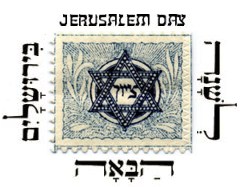 |
Hope and Consolation...

05.24.17 (Iyyar 28, 5777) When we consider our brief lives in this world, it is important to embrace who we are right now, to celebrate our temporary existence, for that is all we have, and to cherish the gift of others whose lives intersect with our own... We are on a journey that leads to what is eternally true and abiding: "The grass withers, the flower fades, but the word of our God will stand forever" (Isa. 40:8). God is the only enduring Reality in a constantly changing world, and He has designed it this way to cause our hearts to search for him. "All flesh is grass, and all its beauty is like the flower of the field" - such is the condition of this ephemeral world with its flux and fortunes. The flesh fades because the breath of the LORD blows upon it (Isa. 40:7). God Himself has ordained human life to be a vapor....
הוֹדִיעֵנִי יְהוָה קִצִּי
וּמִדַּת יָמַי מַה־הִיא
אֵדְעָה מֶה־חָדֵל אָנִי
ho·di·e·ni · Adonai · kitz·tzi,
u·mid·dat · ya·mai · mah · hi,
ed·'ah · meh · cha·del · a·ni

"O LORD, make me to know my end
and what is the measure of my days;
let me know how quickly my life will pass"
(Psalm 39:4)
This world is not our home; we are "strangers" here. It is an affliction to wait for the LORD, a sort of "homesickness" of heart... The apostle Paul says our loneliness and alienation prepare for us an "eternal weight of glory" beyond all comparison, because we are not looking at what can be seen but at what cannot be seen. "For what can be seen is temporary, but what cannot be seen is eternal" (2 Cor. 4:17-18). Just as the "two-souled" man is unstable in all his ways, so the process of being "educated for eternity" means learning to focus our heart's passion and hope on the glory of heaven. "For where your treasure is, there will your heart be also."
God is our "Rock," a metaphor that implies that He is the immovable foundation and cornerstone of all reality. God is our strong refuge in the stormy changes we all face in this world. His Presence both grounds us and sustains our way. Nonetheless we walk by faith, not by sight, and often the sojourner in this world faces testing and even tribulation. In his despair, Job once asked, "If a man dies, shall he live again? All the days of my warfare I will wait until my change comes" (Job 14:14).
 |
Click for larger...
Now more than ever: Choose to fight (ἀγωνίζομαι - "agonize," "struggle") another day. Do not yield to despair or give place to anxiety. Press on and keep fighting the "good fight" of faith (1 Tim. 6:12). You infinitely matter to heaven; your life has great value; you are significant and you are truly loved by our Heavenly Father... There is a "future and a hope" reserved for you (Jer. 29:11); there is "a white stone, and on that stone will be written a new name that no one can understand except the one who receives it" (Rev. 2:17). This promise is given to the "one who conquers" (Τῷ νικῶντι) because of the love and grace of our God. Indeed, by faith we are made "more than conquerors" (lit. "hyper conquerors," ὑπερνικῶμεν) through the Messiah and his love for us (Rom. 8:37).
In our struggle against the darkness, there is an end coming, so don't let your heart grow numb. Never give up hope. God has promised: "I will give you a new heart (לֵב חָדָשׁ), and a new spirit (רוּחַ חֲדָשָׁה) I will put within you. And I will remove the heart of stone (לֵב הָאֶבֶן) from your flesh and give you a heart of flesh" (Ezek. 36:26). Receive God's promise for your soul, since His healing love is what you really need...
Giving of the Torah...
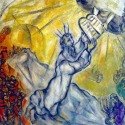
[ The following is related to holiday of Shavuot ("Pentecost"), which begins May 30th... ]
05.24.17 (Iyyar 28, 5777) Though it is not explicitly mentioned in the five books of the Torah, the early sages have long associated the giving of the Torah with the holiday of Shavuot. This comes from a sensible study of the chronology of the exodus itself, calculating the time of the Passover from Egypt (Nisan 15) to the arrival of the Israelites at Sinai in Sivan 1 (Exod 19:1). The earliest extrabiblical source that explicitly links Shavuot with the revelation of the Torah at Sinai is the Book of Jubilees (i.e., Sefer haYovelim: ספר היובלים), dating from the 2nd century BC. Extant manuscripts of this book were found among the Dead Sea Scrolls, indicating that the Shavuot-Sinai connection was made before the advent of Yeshua. The (non-canonical) book is a parallel account of Genesis and parts of Exodus, and includes the observance of Shavuot by Noah before the time of the Flood. In the Book of Jubilees, Noah is told to observe the festival of Weeks and to offer Firstfruits every year as a commemoration of God's covenant to renew the earth (Jubilees 6:15;22). Likewise Abraham and the original patriarchs were said to observe it, though it was forgotten by the Jews in Egypt until Moses reinstated it at Sinai. Shavuot is also mentioned in the apocryphal Book of Tobit (טוביה) and the Book of Maccabees, c. 2nd century BC.
The Talmud (i.e., traditional oral teaching) also attests to the connection between Shavuot and the giving of the Torah at Sinai. The earliest Talmudic statement on the date of the revelation at Sinai is found in Tractate Shabbat 86b. According to these sages, the Israelites left Egypt on Friday, Nisan 15, and the Torah was given exactly 50 days later on Saturday, Sivan 6th. This corresponds exactly with God's instructions to count 50 days from the day after Passover (Lev. 23:15-16). This date later became fixed in the Jewish calendar, and was further supported by reference to Exodus 19:1: "On the third new moon after the people of Israel had gone out of the land of Egypt, on that day they came into the wilderness of Sinai." (For details about the exact timing for this event, see the main Shavuot article here.) The Midrash Rabbah also explicitly makes the Shavuot-Sinai connection as well. The later rabbis refer to Shavuot as "Atzeret" (עֲצֶרֶת), a word that means "withdrawal" (i.e., to the desert to receive the law) and "conclusion" (or the goal of the Passover redemption). Today Jewish tradition regards Shavuot as Zman Mattan Torateinu (זְמָן מַתָּן תּוֹרָתֵנוּ) - "the anniversary of the giving of the Torah." Shavuot is also called Yom HaKahal (יוֹם הַקָּהָל) - the "Day of Assembly" (Deut. 18:16).
At the synagogue, it is customary to start the evening Shavuot service later than usual, to ensure that the 50th day has arrived. Many people remain awake for the entire first night of Shavuot reading a special book (tikkun leil Shavuot) that includes the first and last verses of each Torah portion, the first and last passages of each tractate of the Mishnah, and various passages from the Zohar. This book is read to "repair" the night of Shavuot from the error of sleeping so soundly before the Torah was given at Sinai that God had to awaken the Jews with shofar blasts, thunder, and lightning the following morning.
Jewish tradition states that in every generation each person should consider himself as having personally received the Torah at Sinai. The climax of the Shavuot morning service is the recitation of the famous Akdamut poem followed by the reading of Ten Commandments, when all the congregation stands to "relive" the experience at Sinai. A second Torah scroll is then taken out of the ark and the portion is read (Num. 28:26-31) that describes the sacrificial offerings made at the Temple during Shavuot, and the Haftarah (Ezek. 1:1-28; 3:12) concerns the amazing revelation of God in the form of the Throne/Chariot.
For more on this topic, see: "The Law of Liberty: Empowered to live for God."
The Chesed of Ruth...
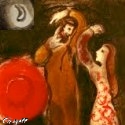
[ The Book of Ruth is traditionally read during the holiday of Shavuot ("Pentecost")... ]
05.23.17 (Iyyar 27, 5777) The Book of Ruth (מְגִלַּת רוּת) tells a marvelous story of redemptive love and devotion (i.e., chesed: חֶסֶד) dating back to the dark period of Jewish history known as the "time of the Judges" (c. 12th century BC). The story is traditionally read during Shavuot, both because the events recounted took place during the time of the spring harvest (linking it to the agricultural aspect of holiday), and Ruth herself is a picture of willing acceptance of a Jewish lifestyle (linking it to the religious aspect of the holiday). Just as Israel willingly accepted the Torah at Sinai without knowing its content (kol asher diber Adonai na'aseh v'nishmah), so Ruth gave up everything she knew to accept the Torah. Like the people of Israel, Ruth believed in order to understand, not the other way around...
Ultimately the story of Ruth illustrates that the law by itself is unable to redeem us (as illustrated by the unnamed 'redeemer' who did not wish to "mar" his inheritance), and therefore something more is needed. A true go'el (גאֵל), or "kinsman redeemer," is marked by love and compassion, just as the law of the Spirit of life (תּוֹרַת רוּחַ הַחַיִּים) is what sets us free from the law of sin and death (תּוֹרַת הַחֵטְא וְהַמָּוֶת). Ruth overcame the "letter of the law" by faith in God's redemptive love, just as Yeshua overcame the judgment of the law by means of God's greater love... Therefore like Ruth, we have to "go to the threshing floor" as a forbidden outsider to lay claim to the redeeming love of God; we have to say to the LORD, "Spread your wings over your servant, for you are my Redeemer" (Ruth 3:9). Indeed, by faith we have to push past the enmity required by the Torah with its commandments and ordinances to receive our healing - and to find our place within the family of God...
כִּי אֶל־אֲשֶׁר תֵּלְכִי אֵלֵךְ
וּבַאֲשֶׁר תָּלִינִי אָלִין
עַמֵּךְ עַמִּי וֵאלהַיִךְ אֱלהָי
ki · el · a·sher · tel·khi · e·lekh
u·va·a·sher · ta·li·ni · a·lin
a·mekh · am·mi · ve·lo·ha·yikh · E·lo·hai

"For where you go I will go
and where you lodge, I will lodge
your people shall be my people, and your God my God."
(Ruth 1:16)
Again, by faith we have to push past the enmity required by the Torah with its commandments and ordinances to receive our healing - and to find our place within the family of God... In this connection it is interesting to see that King David's genealogy not only included the noble line of Abraham/Sarah, Isaac/Rebakah and Jacob/Leah, but it also included Judah/Tamar, Boaz/Ruth, and Salmon/Rahab. Moreover, in the genealogy of Yeshua the Messiah given in Matthew (1:1-16), only four women (besides Mary) are explicitly named: Tamar (who seduced her father-in-law), Rahab (a prostitute), Ruth (a Moabitess), and "the wife of Uriah" (i.e., Bathsheba, an adulteress). Each of these women of faith illustrate that God's love and grace overcomes His judgment. Here is a (very simplified) diagram I made to indicate some of the relationships:
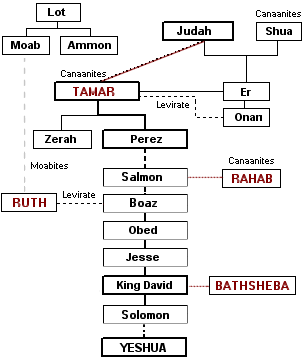 |
Ultimately, Ruth's teshuvah was accepted, even though she was an outcast - a Moabite of whom the Torah stated: "none of them may enter the assembly of the LORD forever" (Deut. 23:3). Ruth's great faith was not unlike that of the Canaanite woman who was accepted by Yeshua (Matt. 15:22-28). Both women overcome even the law of the Torah by faith in God's chesed and grace... In the case of Ruth, her faith enabled the House of David to come - and from this, the line of Yeshua our Messiah and Savior...
Note: For more on this subject, see "The Chesed of Ruth."
Shavuot and Unity...

[ The following is related to holiday of Shavuot ("Pentecost"), which begins May 30th... ]
05.23.17 (Iyyar 27, 5777) The holiday of Shavuot (i.e., "Weeks" or "Pentecost") stands in contrast to Passover that requires unleavened bread (i.e., matzah), since the two loaves of bread made from the first fruit of the wheat harvest (shtei ha-lechem) were baked with chametz (yeast) before being "waved before the LORD" (Lev. 23:15-20). There is some uncertainty among Jewish sages regarding the meaning of the use of the otherwise forbidden leaven (see Lev. 2:11), though prophetically it pictures the "one new man" (composed of both Jew and Gentile) presented before the altar of the LORD (Eph. 2:14). The waving of the "two loaves" of leavened bread therefore prophesied the firstfruits creation of the "one new man," both Jew and Gentile, that would be "firstfruits" of the Kingdom of God. As Yeshua plainly taught, ultimately there will be one flock, and one Shepherd (John 10:16).
Each of us - and this is especially true and vital for those who belong to Yeshua the Messiah - are connected to one another as ish-echad chadash (אישׁ־אחד חדשׁ) "one new man" (Eph. 2:15). Our welfare, blessing, and ultimate salvation is bound up with one another. Just as the midrash says that each soul is linked to a letter of the Torah, so each of us is linked to the LORD Yeshua who gave Himself up for us in order to reconcile us to God. Each child of God is part of the message of Yeshua's life and love in this world.
Effective Spiritual Warfare...
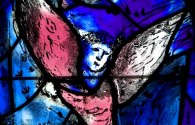
05.23.17 (Iyyar 27, 5777) There are two basic approaches to "spiritual warfare." The first is to discern the presence of evil and then pray for God's intervention, deliverance, protection, and so on. The second is to use ha'ayin ha'tovah (i.e., the good eye) and focus on the truth and Reality of God instead - to "set your thoughts on things above" (Phil. 4:8). Whereas the former approach may at times seem necessary to repudiate encroaching darkness to find inner peace, the latter approach has the decided advantage of trusting in the Divine Presence that pervades and overrules all things (Psalm 16:8). When David was surrounded by the enemy, he kept focused on the glory of the LORD. David knew that God would shelter him and elevate him above the powers of darkness (Psalm 27:1-6). The highest form of spiritual warfare, then, is to consciously turn away from fear by choosing to praise the LORD God, magnifying His Name, and walking before Him in awe...
Sound of Silence...

[ The following is related to our Torah reading for this week, parashat Bamidbar... ]
05.22.17 (Iyyar 26, 5777) The Hebrew word midbar ("desert") shares the same root as davar (דּבר) which means "word." We often need to be alone to hear God speaking kol demamah dakkah (קוֹל דְּמָמָה דַקָּה) - "the sound of a low whisper" (1 Kings. 19:12), and the journey into the desert was God's way of separating His people to speak with them "privately," so to speak (Jer. 2:2). But to hear the word we must humble ourselves, and the desert (i.e., "word") of Sinai is therefore first of all the word of humility (עֲנָוָה). When God spoke Torah to Israel, it was from a nondescript mountain - a place of emptiness, brokenness and need. Indeed, another word for Sinai is "chorev" (חרֵב), a word that means dryness and desolation. That is the starting point -- not the lush places of a future paradise. We receive Torah "bamidbar" because we can only hear God's davar in a place of lowliness and inner quiet. God brings us to an arid place -- inhospitable, and dangerous -- to reveal our need for Him, to show Himself as our Sustainer. The way to Sinai is a necessary excursion to prepare us to look for the greater hope of Zion. May God help us heed the whisper of His Spirit...
A Spirit of 'Yes'...

05.22.17 (Iyyar 26, 5777) Our Torah portion this week (i.e., Bamidbar) begins: "The LORD spoke to Moses in the desert of Sinai, in the tent of meeting (ohel mo'ed), on the first day of the second month, in the second year after they had come out of the land of Egypt" (Num. 1:1). Note again that the LORD spoke in the desert (ba-midbar) of Sinai, and that the Hebrew word for "desert" (i.e., midbar: מִדְבָּר) shares the same root as the "word" (i.e., davar: דָּבָר), which suggests that we hear the Word of God in a place of emptiness, brokenness and ongoing need. But note further that the LORD spoke in the "tent of meeting" (אהֶל מוֹעֵד), which may be read as the tent of "mo'ed" (מוֹעֵד), or "holiday." We celebrate our need for God's healing and turn to him in a state of gratitude, even despite our sinful condition (Psalm 119:71). We take courage and draw near, renewed in trust. That is why the verse says it was "the first day of the second month" (חדֶשׁ הַשֵּׁנִי בַּשָּׁנָה) -- the word "month" (chodesh) can be read as "new" (chadash), suggesting it was a time of renewal, a time to celebrate a new beginning (Acts 2:1-4). When David prayed in his need: "Create in me a clean heart, O God, and renew a right spirit within me" (Psalm 51:10), the Hebrew may be read: "Create in me a pure heart, O God, and renew within me ruach nachon (רוּחַ נָכוֹן) - a spirit of "Yes!" As Paul said of Messiah our Healer: "For all the promises of God find their Yes in him" (2 Cor. 1:20).
Remembering our Roots...
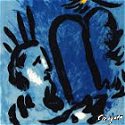
05.22.17 (Iyyar 26, 5777) It has been a common experience of mine over the years to encounter certain people who believe they are somehow immune from the influence of "tradition" in their lives, and that they are therefore able to transcend its effect and provide unbiased interpretations of the Scriptures... Well, on the contrary, it's important to be humble regarding this matter and to understand how radically we are influenced by the past. After all, we are historical creatures rooted in a particular culture, endowed with a specific heredity and unique genetic code. We subconsciously inherit norms, customs, ceremonies, decorum, routines, patterns of speech (e.g., accents), right "from our mother's knee." In short, our use of language itself -- the way we describe seeing, hearing, tasting, feeling, etc. -- is based on customary forms of conventional usage. The bottom line seems to be that we are products of our culture from the moment we take our first breath in this world... Tradition -- of some kind or another -- is simply an inescapable and omnipresent fact of our existence.
In light of this, it is evident that we could not understand even the first word of the Scriptures without the aid of custom and tradition... There is a story that illustrates this point. A pagan came to Hillel seeking to convert to the faith in the LORD but was troubled with the idea of tradition, though he accepted the idea of the written Scriptures. Since the man did not know how to read Hebrew, however, Hillel began pointing to the letters in the written Torah to teach him the alphabet: "This is Aleph... this is Bet... this is Gimmel," and so on, until the man began to understand the letters of the Aleph-Bet. "Now come tomorrow, and I will teach you more." The next day, Hillel pointed to the exact same letters but reversed their names, "This is Gimmel... this is Aleph... this is Bet," and so on. The convert was confused: "But yesterday you said just the opposite!" Hillel replied, "Now you have had your first lesson. You see that the written word alone is insufficient, and we need the tradition to explain God's Word." Another way to make this point is to say that the Torah was not revealed along with a dictionary that defines the meaning of its words...
All this is said to remind us that the transmission of Torah from generation to generation demands that we trust. Indeed the very concept of "Torah" (or Scripture) is bound up with trust and community... This is true of the written word (i.e., trusting in scribal traditions that preserved the Scriptures for us), as well as the oral word (i.e., the customs, interpretations, translations, and wisdom that explain the meaning of the words themselves). Knowledge has been defined as "justified true belief," which implies that there can never be knowledge without trust. It is ludicrous to think that we can translate the Scriptures in a vacuum - all by ourselves without any help from others... We must humble ourselves and become "like little children" to learn from those who have gone before us, and this is why the Jewish value of Talmud Torah - teaching children the words and values of Torah - is regarded as so important. As the Talmud puts it, "The world exists because of the breath of the schoolchildren who study Torah" (Shabbat 119b).
But what about the words of the Holy Scriptures? Don't they transcend cultural factors? Are they not timelessly true and exempt from culturally conditioned ways of reading them? Hardly. Both Christianity and Judaism (as opposed to some other religions) do not worship a "book" that "floated down" from heaven complete with chapters and verses. Nor do we believe in a "divine dictation" theory that claims the Scriptures are "Xerox" duplicates of the words spoken by an angel or other divine being. No, the Scriptures are regarded as the products of history -- sacred history, of course -- but history nonetheless. Therefore we have the same problems trying to discern the meaning of the Scriptures as we do for any other type of literature: Who was the original author and the intended audience? What were the cultural circumstances? Why was this written? What kind of writing is it? Is it a poem (like a psalm), or perhaps an instructional maxim (like a proverb)? Am I reading an historical account, a description of a religious ritual, or something else? First we must know what we are reading - and to understand its historical context. Ignoring this simple rule leads to all sorts of errors in our reasoning and makes us unwitting victims of our own cultural biases. We will find ourselves "reading into" the Scriptures things that just aren't there, chaverim!
Regarding the literal words of the Scriptures, it's important to remember that the decisions made regarding which scrolls were "canonical" (and therefore to be included in our modern Bibles) came from the decisions made by earlier faith communities -- just as such decisions likewise preserved the sanctity of the sacred texts themselves. For instance, without the Jewish scribal transmission known as the masorah (מָסוֹרָה), it's unlikely we would know how to read and interpret many passages of Scripture today (Christianity also has its own scribal traditions that preserved the transmission of the Greek New Testament). Original Hebrew did not include vowel markings or other punctuation. Neither did the Greek of the New Testament, for that matter. Indeed, we can only understand the message of our faith through the medium of historical continuity, tradition, and ongoing dialog.... This was true even in the days of Yeshua, who endorsed the traditional tri-fold division of the Jewish Scriptures (the Law, Writings, and Prophets - Luke 22:44) and relied on Jewish tradition to teach great truths about his message (e.g., he associated the Passover seder with the "Last Supper" rituals of the New Covenant; he called himself Living Water and the Light of the world during Sukkot, and so on.) Yeshua placed high value on the "jots and tittles" of the texts of Scripture that were part of the spiritual heritage of his day (Matt. 5:18).
But didn't Yeshua condemn the "traditions of men" in His day? Didn't he reject the traditions of the elders of Israel (Mark 7:5-13)? Didn't he rhetorically ask the religionists of his day, "Why do you break the commandment of God for the sake of your tradition" (Matt. 15:2-10)? Yes he did, but it's important to understand the historical context of these sorts of statements. First, he was certainly not condemning "true traditions" that are outlined in the Scriptures themselves. Yeshua's entire ministry was predicated on the "appointed times" of the LORD and their fulfillment in him. "Do not think that I have come to abolish the Law or the Prophets; I have not come to abolish them but to fulfill them" (Matt. 5:17). No, what Yeshua appeared to take issue with was the dogmatic interpretation of various aspects of ritual law and with the practice of "building of fences" around the original intent of the Scriptures. These man-made "fences" (gezerot) actually created a gilded cage around the Scriptures and effectively relocated the source of authority to the self-styled religious interpreters of the day... This was the crux of the disagreement between Yeshua and the Pharisees. (For more about this, see "The Heart of the Law; the Law of the Gospel".)
We all live by hours of the day, days of the week, seasons of the year, and God has revealed cycles and patterns of community life for Israel. Indeed, the mo'edim (festivals and appointed times) of the LORD are rooted in history and have prophetic implication for our lives. The "traditions of the elders" which Yeshua condemned had more to do with hidebound interpretations of the Scriptures (later embodied in the "Oral Law") than with the idea of tradition itself. The Greek word for "tradition" (παράδοσις) is a neutral term, simply meaning "handing down" (from παρά (down, from) + δίδωμι (to give)) what was given before. Both Judaism and Christianity hold to an "oral tradition" following the ministries of Moses and Yeshua, respectively. Because of the imminent expectancy of the return of Yeshua after His resurrection, the gospels were not committed to formal writing until the prospect of the death of the eyewitnesses loomed large. Moreover, there were numerous Gospel accounts which were eventually compiled into a standardized retelling of the story (Luke 1:1-4). In Jewish tradition, Moses received the written law at Sinai, but this cannot be understood in a vacuum. For instance, the details about how to construct the furnishings of the Tabernacle are not given, and the written law even endorsed the establishment of "judges" to interpret case law and establish precedent. Likewise the Apostle Paul admonished, "Therefore, brethren, stand fast, and hold the traditions (παράδοσις) which ye have been taught, whether by word, or our epistle" (2 Thess. 2:15, 1 Cor. 11:2). Indeed, in a New Testament sense, "tradition" refers to the Apostolic teaching in general, as well as the valid inferences from the Tanakh that are thereby implied (2 Tim. 3:16, Matt. 13:52).
There is legalism -- i.e., the idea that we are duty bound to perform certain rituals, behave a certain way, follow a set of rules, etc., and there is the liberty we enjoy as the heirs of God. There is a higher way of understanding the same thing -- namely understanding as an adult rather than as a child. Apprehending your identity as a son (or daughter) of the LORD God of Israel makes you no longer an outsider, a "child," an "outcast," etc., to the covenantal obligations and promises given to the Jewish people. As a co-heir and fellow member through adoption into the household of God, you are a new creation. Being a Jew is a matter of having a new heart, chaverim (Rom. 2:28-29).
For more on this topic see: "The Role of Tradition" and "Remembering our Roots."
Revelation of the Torah...
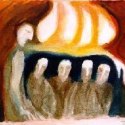
[ The following is related to the holiday of Shavuot, which begins May 30th at sundown... ]
05.22.17 (Iyyar 26, 5777) During the holiday of Shavuot ("Weeks" or "Pentecost") we remember how the LORD graciously condescended to meet with the Jewish people at Sinai, and how all the people heard the Voice of God (קוֹל אֱלהִים) speaking from the midst of the fire (Deut. 4:33). This awesome event foreshadowed the great advent of the King and Lawgiver Himself, when the Eternal Word (דְבַר־יְהוָה) became flesh to dwell with us (Phil. 2:6-7; John 1:1,14), and it further foreshadowed the advent of the Spirit of Truth given to the disciples of Messiah (Acts 2:1-4). Any theology that regards God as entirely transcendent will have a problem with divine immanence, since the highness, holiness, and perfection of God will make him seem distant, outside of us, far away, and even unknown... Incarnational theology, on the other hand, manifests the nearness of God to disclose the divine empathy. Indeed, the LORD became Immanuel (עִמָּנוּ אֵל), "one with us," to share our mortal condition, to know our pain, and to experience what it means to be wounded by sin, to be abandoned, alienated, forsaken. The "Eternal made flesh" bridges the gap between the realm of Ein Sof (אין סוף), the Infinitely transcendent One, and the finite world of people lost within their sinful frailty. Of course we believe Adonai Echad (יְהוָה אֶחָד) - that the "LORD is One" - both in the sense of being exalted over all things but also in the sense of being compassionately involved in all things (Rom. 11:36). During Shavuot we celebrate the giving of the Torah both at Sinai, the ratification of the New Covenant (בְּרִית חֲדָשָׁה) in Jerusalem (Acts 2), and the truth revealed within our hearts at this very hour. We celebrate that God is indeed the King and Ruler over all, and we further affirm that God's authority and rule extends to all possible worlds - including the realm of finitude and even death itself.
כִּי יְהוָה שׁפְטֵנוּ יְהוָה מְחקְקֵנוּ
יְהוָה מַלְכֵּנוּ הוּא יוֹשִׁיעֵנוּ
ki · Adonai · sho·fe·tei·nu · Adonai · me·cho·ke·kei·nu
Adonai · mal·kei·nu · hu · yo·shi·ei·nu

"For the LORD is our judge; the LORD is our lawgiver;
the LORD is our king; He will save us."
(Isa. 33:22)

Hebrew Study Card
The Righteousness of God (צדקת יהוה)

05.22.17 (Iyyar 26, 5777) It is not "I obey, therefore I am accepted," but rather, "I am accepted, and that is the obedience (ὑπακούω) of faith." Accepting that you are accepted – despite your unacceptability – is the first (and last) step of faith, and there is no point beyond we must go. It is not your wisdom or cleverness that enlightens your way in the truth, however, but the miracle of disclosure from heaven. It is all a gift: you need God to even see that you need God! Right thinking is indeed a path to God, but it is the givenness of truth that enables the seeker to seek; it is the reality of the Teacher (the Savior) that is all-important. By themselves, true beliefs do not conjure divine favor, and indeed they may hide the deeper truth that the heart exists in untruth despite the head's "true" doctrine. Likewise, while goodness is indeed a path to God, true goodness is that found in God's righteousness that makes the way right for the trusting heart... Genuine obedience to the truth of God - inner rather than outer obedience - marks the divine mercy of transformation.
"Not by works of righteousness (מַעֲשֵׂי הַצְּדָקָה) which we have done, but according to his mercy he saved us, by the washing of regeneration, and renewing of the Holy Spirit, whom he poured out on us richly through Yeshua our Savior, so that being justified by His grace we might become heirs according to the hope of eternal life" (Titus 3:5-7).
The Great Vision of Zion...
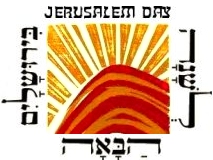
05.21.17 (Iyyar 25, 5777) In Israel, "Jerusalem Day" (i.e., Yom Yerushalayim: יום ירושלים) commemorates the re-unification of old city of Jerusalem on June 7th, 1967 during the miraculous Six Day War. In 1968 the Chief Rabbinate of Israel declared Iyyar 28 to be a holiday thanking God for answering the 2,000-year-old prayer לשנה הבאה בירושלים, "Next Year in Jerusalem." Later, on March 23, 1998, the Israeli Knesset passed the "Jerusalem Day Law" (חוק יום ירושלים), marking Iyar 28th to be a national holiday. This year, Jerusalem Day runs from May 23rd (after sundown) through May 24th (until sundown). Let us remember the great vision of Zion, dear friends!
Click here to learn 25 reasons why Jerusalem matters...
Counted by God...
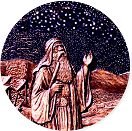
05.21.17 (Iyyar 25, 5777) Our Torah for this week (i.e., parashat Bamidbar) is always read immediately before the great holiday of Shavuot (i.e., "Pentecost"), which is the time we celebrate "mattan Torah" -- the giving of the Torah of the LORD exactly 50 days after Israel first left Egypt during the great Passover redemption. Central to the message of Bamidbar is the counting of the person, identifying his "place" within Israel (Num. 1:52), and therefore the sages link "being counted" with the revelation of God itself. In other words, as we come to know who we are as God's redeemed people, as we learn to count ourselves as among his beloved, so we will receive Torah and will be accounted among his people. Our heads will be "lifted up," and we will receive the first blessing of Torah, namely: anokhi Adonai Elohekha (אָנכִי יְהוָה אֱלהֶיךָ), "I AM the LORD your (singular) God" (Exod. 20:2).
"The LORD spoke to Moses in the desert of Sinai... saying שְׂאוּ אֶת־ראשׁ- 'Lift up the head' (i.e., count) of the children of Israel" (Num. 1:1-2). The Torah commentator Rashi noted that as we are counted, so we are lifted up and beheld by God. In other words your life matters to heaven, and you are counted worthy because of God's great redeeming love. The sages say that each of us is as a letter of Torah (אוֹת הַתּוֹרָה); each of us counts in God's book. Indeed our Savior Yeshua said, "Even the hairs on your head are numbered" (Matt. 10:30).
Countdown to Revelation...

05.21.17 (Iyyar 25, 5777) Tuesday, May 30th (at sundown) marks the end of the 49 days of counting the omer, and therefore the following day is the "Jubilee" of Shavuot (i.e., "Weeks" or "Pentecost"). Recall that the Torah instructed (Lev. 23:15-16) that we count from the day following the Passover (i.e., Nisan 16) for exactly seven weeks, until Sivan 5 (i.e., from April 11th through May 29th this year). On the 50th day (i.e., Sivan 6, May 30th), a special celebration was to be observed marked by jubilation and thanksgiving. This annual "countdown period" recalls both the time from the Passover until the revelation at Mount Sinai, and the advent of the Holy Spirit among Yeshua's disciples in Jerusalem (Acts 2:1-4).
 |
Note: I am aware that some people insist that Shavuot must occur on a Sunday, following the Sadducee's interpretation that "the day after the Sabbath" (Lev. 23:15) refers to the first day of the week, rather than to the day following the Sabbath of Passover. This has been the historical position of most "mainline" Christian churches... Everyone can (and should) follow their own earnest conviction on this subject (Rom. 14:5). I follow the traditional Jewish interpretation to identify with the worldwide Jewish community, whereas others might begin the omer count starting on the first Sunday after Passover. I would urge everyone to exercise humility here, because there are genuine differences of opinion among people of good will on this subject. As it is written: "Knowledge puffs up, but love builds up. If anyone imagines that he knows something, he does not yet know as he ought to know; but if anyone loves God, he is known by God" (1 Cor. 8:1-3).
Feeding on Faithfulness...
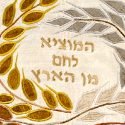
05.19.17 (Iyyar 23, 5777) In our Torah for this week (i.e., Bechukotai) we read: "You shall eat your bread to the full and be satisfied" (Lev. 26:5). The gift of contentment is a great blessing, since it means being free from the pain produced by unrelenting and imperious desire... Indeed, a perpetual, insatiable craving is a sign of slavery to inner emptiness, and no amount of food, drugs, romance, etc., can ever fill this spiritual void. This is why we need true bread, the bread that gives life (לֶחֶם הַחַיִּים), and this bread is the spiritual nourishment Yeshua gives to our hearts (John 6:35). When we taste his bread, when we commune with him, we soon learn that our desires for other things are hallow, futile, and empty. The more we feed on his love, the more we will find ourselves free the tyranny of lesser desires.
תּוֹדִיעֵנִי ארַח חַיִּים
שׂבַע שְׂמָחוֹת אֶת־פָּנֶיךָ
נְעִמוֹת בִּימִינְךָ נֶצַח
to·di·ei·ni · o·rach · cha·yim
so·va' · se·ma·chot · et · pa·ne·kha
ne·i·mot · bi·min·kha · ne·tzach

"You will cause me to know the path of life;
in your presence there is fullness of joy;
at your right hand are pleasures forevermore."
(Psalm 16:11)

Download Study Card
The blessing we traditionally regularly recite over bread (hamotzi lechem) is a prophecy of sorts: "Blessed are You, Lord our God, who will bring bread up from the earth." This applies first of all to the resurrection of Yeshua from the dead, but it also applies to Yeshua as lechem ha-chayim (לֶחֶם הַחַיִּים), the Bread of Life, who meets our heart's needs (John 6:35). As we feed on God's faithfulness, we shall be satisfied... May we all partake of the blessing!
Bound by Love's Promise...
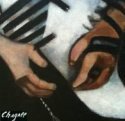
05.19.17 (Iyyar 23, 5777) From our Torah portion this week (i.e., Bechukotai) we read: "Then [after all the various judgments have befallen the people] I will remember my covenant with Jacob, and I will remember my covenant with Isaac and my covenant with Abraham, and I will remember the land" (Lev. 26:42). Here we note the "deeper Torah" of God's unconditional promise to the children of Israel that "contextualizes" the various tribulations they would suffer because of their disobedience to the terms of the covenant given at Sinai (Gen. 15). Therefore the Apostle Paul appealed to God's promises given to Abraham as the foundation for Torah, not to Israel's righteousness procured by means of the law (Rom. 9:31; Gal. 4:24-27). "For the promise to Abraham and his offspring that he would be heir of the world did not come through the law (οὐ γὰρ διὰ νόμου) but through the righteousness of faith" (Rom. 4:13). The better covenant of Zion was prefigured at Mount Moriah - and hearkens back to Abraham and Isaac - not the later covenant made at Sinai (Gen. 22:16-18; Heb. 6:13-15; John 3:16). As for Israel in the galut (exile), God has promised: "But I will for their sake remember the covenant with their forefathers, whom I brought out of the land of Egypt in the sight of the nations, that I might be their God: I am the LORD" (Lev. 26:45). Note again that this covenant relationship was established when we were without anything – we had no Torah, no mitzvot, nor any good deeds to commend ourselves before heaven. Nevertheless, God chose us and called us his people, and all this comes from his great love.
Bound by love's promise... Now that's Torah!!! SHABBAT SHALOM!
Always the First Step...

[ The following is related to our Torah reading for this week, parashat Bechukotai... ]
05.19.17 (Iyyar 23, 5777) There is a core element of your spiritual life that is all-determinative, that affects everything else, and that is the question of whether you will choose to "show up," whether you will engage it's hope; and whether you will open your eyes and yield yourself to the light... This is an ongoing decision. Our Torah portion for this week begins, "If you walk in my statutes (אִם־בְּחֻקּתַי תֵּלֵכוּ) and observe my commandments and do them..." (Lev. 26:3). The sages note that unlike the holy angels, we must "walk out" the faith of our days, and therefore we are always moving either forward or backward. God's sun shines on the just and unjust alike (Matt. 5:45). Every human being lives by faith of some kind, and it is therefore impossible to opt out of the decision to "choose this day whom we shall serve" (Josh. 24:15). Indifference or apathy is as much a spiritual decision as is outright rebellion, and if we do nothing today to draw us near to the Lord, we will eventually regress and slip backward. This is all very sobering. "No one knows the day or hour," and that's why it is so vital to turn to God and be healed while there is still time. So turn today and bacharta ba'chayim (בָּחַרְתָּ בַּחַיִּים) - "choose life!" "For this commandment (of turning to God) is not hidden from you, and it is not far away... No, the matter is very near you - in your mouth and your heart - to do it" (Deut. 30:11-14; Rom. 10:8-13).
What's perhaps most heroic about Job is that he never turned away from hope, despite the crucifixion of his world. As Kierkegaard said, "The moment the LORD took everything away, he did not say, 'The LORD took away,' but first of all he said, 'The LORD gave..." (Upbuilding Discourses). Amen: יהוה נָתַן ויהוה לָקָח. His later words of protest were born of faith's deep struggle: "Where are you, God? Have you not promised never to leave me? Why am I alone in this pain, blind to your Presence?" Job's struggle to vindicate God's goodness and love despite inexplicable suffering was not a problem of unbelief, but rather a problem of how to reconcile the gap between present reality and the expectation of hope...
Walk in the truth...
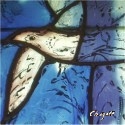
05.19.17 (Iyyar 23, 5777) From our Torah portion this week (Bechukotai) we read: "If you walk in my decrees (אִם־בְּחֻקּתַי תֵּלֵכוּ) and guard my commandments (ואֶת־מִצְוֹתַי תִּשְׁמְרוּ) and do them (וַעֲשִׂיתֶם אתָם), then I will give you your rains in their season, and the land shall yield its increase, and the trees of the field shall yield their fruit" (Lev. 26:4). Note the order in this verse: first we learn to walk in God's "decrees" and then we do his "commandments," which teaches us that the fear of God, the respect for His authority, must come first. Note also the connection between our reverence before the Divine Presence and its effect on our physical environment. When we walk in the will of God, yielding our hears to his direction (Torah), we become vessels of his presence in the world and conduits of blessing to our surroundings. Indeed, as we yield to God's truth, even the sword of our enemies will be unable to be used against us and we walk in peace (Lev. 26:6; Prov. 16:7).
The Torah commentator Rashi noted that the phrase, "if you walk in my decrees" refers to labor in the study of Torah (i.e., limud Torah: לימוד תורה), since we cannot mindfully observe God's decrees (chukkim) and commandments (mitzvot) without first studying Torah... As it says in our Sciptures: "Make yourself diligent (σπούδασον σεαυτὸν) to be genuine before God, a workman that is unashamed, living the message of truth accurately" (2 Tim. 2:15). "If you will walk" is an invitation to grow in grace and understanding of God's truth.
Shabbat Shalom, and thank you for your prayers, dear friend...
Theology of Flowers...

05.19.17 (Iyyar 23, 5777) "Why are you so anxious? Take a lesson from the wildflowers... They neither toil nor spin, yet even Solomon in all his royal glory was not arrayed like one of these ... And if your heavenly Father gives such attention to the appearance of flowers, many of which grow in unseen places, surely he will attend to you, too" (Matt. 6:28-30). So relax; do not let worry blind you to God's ongoing care; do not live as those without faith. As his child, you have a sacred place in your Father's heart; you have a share in his house above. See the Lord as your Dwelling Place "in all generations"; behold his unchanging glory despite the fleeting shadows of this world.
אֲדנָי מָעוֹן אַתָּה הָיִיתָ לָּנוּ בְּדר וָדר
Adonai · ma·on · at·tah · ha·yi·ta · la·nu · be·dor · va·dor

"O Lord, you have been our dwelling place in every generation"
(Psalm 90:1)

The Eternal is our refuge, our "dwelling place," in all generations, and that means in the present generation as well, on the other side of fleeting appearances of this world. When we pray to God as Avinu She-bashamayim, "Our Father in Heaven," we are calling to the One (שֶׁ) who is in (בּ) the midst of the waters (שָׁמָיִם) of Life. As we contemplate God's Eternality and power, may we realize the wonder and sanctity of our short time here.
Some people experience anxiety because they feel powerless in the face of life's changes, so they "compensate" by trying to hold on to what cannot be held: "All the desires of this world are like rays of light. You try to catch them in your hand only to find there is nothing in your grasp" (Nachman). Nonetheless, the heart wants life to be both real and yet unchangingly ideal, and the soul yearns for loving relationships that will not be drowned by the inevitable flow of time. In light of this deep inner conflict, the existential question we must face is whether we will "agree" to let go and trust the flow of life, or whether we will protest by demanding our own "heaven" in the here and now. Will we accept life on life's terms, or on our own? Honoring the flow of life is to honor the Father's will for us, to let go of our dread (i.e., our craving for temporal security) by trusting in His sovereign plan for all of life. We overcome anxiety by trusting that God is in the "midst of the whirlwind" of change and is supervising the end of all things according to his good and perfect purposes (Rom. 8:28).
The bloom of every flower is by eternal purpose, and not one common sparrow is forgotten by your Heavenly Father (Luke 12:6). God's irresistible providence comprehends and orders all things, in every possible world -- from the realm of the subatomic to the cosmic motions of the heavenly bodies. The LORD is the Center: "All things were created by Him, and for Him" and in Him all things consist (συνεστηκεν, lit. "hold together") (Col. 1:16-17). In light of God's providential ordering of our lives, Blaise Pascal asked, "What is left for us but to unite our will to that of God himself, to will in him, with him, and for him the thing that he has eternally willed in us and for us." The Mishnah says it this way: "Do His will as if it was your will that He may do your will as if it was His will" (Avot 2:4). In other words, what else can we do but learn to trust, accept, and to say "yes" to life -- even if at times we may feel like strangers in exile... All our days are ordained; recorded in God's scroll. Therefore may God "teach us to number our days to get a heart of wisdom" (Psalm 90:12).
Providential Darkness...
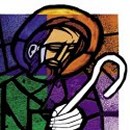
[ The following is related to our Torah reading for this week, parashat Bechukotai... ]
05.19.17 (Iyyar 23, 5777) Since everything is under the Divine Supervision (i.e., hashgachah pratit: הַשְׁגָחָה פְּרָטִית), it is forbidden to regard actions and outcomes as the result of accident, chance, "luck," or happenstance... Those are all pagan ideas, based in ignorance and superstition. Faith in the LORD God Almighty is grounded in unqualified trust that He is also Adonai Ro'i (יהוה רעי), the LORD your Shepherd, the One who restores your soul, and that conviction provides the framework for apprehending the truth of Torah. A lost faith regards the events of life as random, based on "fortune," and blind chance; it no longer sees God's hand in the affairs of daily life, but consigns the Divine Presence to a place of functional exile. For this the "like for like" judgment is given: as you regard your life as the product of random forces, so you will be unable to discern God's hand in your daily life.
For more on this subject, see "The Tochechah: Further Thoughts on Bechukotai."
Lifting up your soul...

05.19.17 (Iyyar 23, 5777) Where it is written, "Unto thee, O LORD, do I lift up my soul" (Psalm 25:1), the Hebrew verb translated "I lift up" (i.e., essa: אֶשָּׂא) comes from a root (i.e., nasa: נָשָׂא) that means "to carry," but it also alludes to the "carrying away" or the "lifting up" of a bride during a traditional Jewish marriage ceremony (i.e., nisu'im: נִשׂוּאִים). This suggests that when we "lift up our soul" to the Lord, we are "entering into" our relationship as the beloved of God by trusting and celebrating our covenant love relationship with him. In the Hebrew mindset, we never simply "say" or "recite" a prayer to Hashem, but we "lift up" our soul, that is, we elevate our hearts to receive God's love and blessing for our lives...
אֵלֶיךָ יְהוָה נַפְשִׁי אֶשָּׂא
e·le·kha · Adonai · naf·shi · es·sa

"Unto thee, O LORD, do I lift up my soul"
(Psalm 25:1)

Cheshbon HaNefesh...

05.18.17 (Iyyar 22, 5777) "Examine yourselves, to see whether you are in the faith; test yourselves" (2 Cor. 13:5). Do you really want God - the Living God - to be intimately present in your life? "[Repentance] means unlearning all the self-conceit and self-will that we have been training ourselves into... It means killing part of yourself, under-going a kind of death" (Lewis). Indeed, "nothing is more certain: Coming close to God brings certain catastrophe [to the ego]. Everyone whose life does not bring relative catastrophe has never even once turned as a single individual to God; it is just as impossible as it is to touch the conductors of a generator without getting a shock" (Kierkegaard). How much easier is it to pretend that you are "spiritual," to continue in self-deception and to defraud yourself of the highest?
The Troubles of Love...
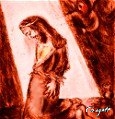
05.18.17 (Iyyar 22, 5777) Parashat Bechukotai is the concluding portion of the Book of Leviticus (וַיִּקְרָא), which is the the central book of the Torah. In light of all that God had done for the Jewish people - from their great deliverance in Egypt to the ordination of the priesthood in the Tabernacle - God expected them to live up to their high calling as His chosen people: "You shall be holy, for I the LORD your God am holy" (Lev. 19:2). Therefore, some of the sages say that the central point of this concluding portion is tochachah (i.e., the warning of punishment) rather than nechamah (i.e., comfort). The focus is not, "If you walk in my laws" (Lev. 26:3), but rather, "if you do not listen (shema) to me" (Lev. 26:14).
It has been said that the opposite of love is not hate, but rather indifference, and that explains why the punishments would come if the people "left their first love." Indeed, the "rebuke" portion of the tochachah begins with v'im lo tishme'u li (וְאִם־לא תִשְׁמְעוּ לִי), "if you do not listen to me" (Lev. 26:14), which recalls the Shema and the duty to love the Lord bekhol levavkha, "with all your heart." If the people walk carelessly (i.e., keri: קְרִי) with God, then God will afflict them with "the troubles of love" (i.e., yissurei ahavah: יִסּוּרֵי אַהֲבָה). A student once asked his rebbe: "Do we get punished for our sins in this world?" His succinct response was, "Only if we are made fortunate..." The worst possible fate is for God to be indifferent to someone! Can anything be more tragic than to be forgotten or to go unnoticed by God? It is far better that He afflict you with yissurim shel ahavah - the "troubles of love!"
The tochachah of Bechukotai begins with 11 verses that promise blessings for obedience to God's laws, but three times as many (i.e., 33 verses) that promise punishment for disobedience. To help "offset" this discrepancy, the midrash notes that blessing section begins with the letter Aleph (in the word אִם) and ends with the letter Tav (in the word קוֹמְמִיּוּת), which suggests that the blessings encompass all other possible blessings (from Aleph to Tav). On the other hand, the punishment section begins with the letter the Vav (in the word וְאִם) and ends with the letter Hey (in the word משֶׁה), the last two letters found in the Sacred Name (יהוה), which suggests that God's compassion would be present even in the suffering to come in the latter days. Another way to look at this is to regard the letter Vav as the symbol of man, and the letter Hey as the symbol of the Spirit: in the end - after the punishments were complete - God's compassion would prevail over His judgment for sin, and the Spirit of God would rest upon Israel. The midrash further states during the days of the Messiah, Israel will keep the Torah, "from Aleph to Tav" (i.e., from beginning to end), and at that time all the blessings God promised to them would finally be fulfilled.
The idea of tochachah is not simply something for ethnic Israel, of course, since the New Testament likewise warns us that God will punish those who likewise walk carelessly (i.e., keri: קְרִי) with Him. Have you forgotten the exhortation that addresses you as God's children? "My son, do not regard lightly (ὀλιγώρει) the discipline of the Lord, nor be weary by his reproof (תּוֹכֵחָה). For the Lord disciplines the one he loves, and reproves (יוֹכִיחַ) every child whom he receives" (Heb. 12:5-6; Prov. 3:11-12). The Lord charged the assembly at Ephesus that they had let go of their first love. Yeshua therefore urged them: "Remember from what high state you have fallen and repent! Do the deeds (ἔργα) you did at the first; if not, I will come to you and remove your menorah from its place – unless you repent" (Rev. 2:4-5). Because God is never indifferent toward those who are trusting in His salvation, he will discipline and correct us to keep close to Him. He will afflict us with the "troubles of love." As it is written, "It is a fearful thing to fall into the hands of the Living God" (Heb. 10:30).
Regarding the list of punishments in this section, I'd like to relate a beautiful story I once read. The child of a famous Torah sage was used to hearing his father read the weekly Torah portion at synagogue, but on the Shabbat of Bechukotai his father happened to be out of town, and the boy listened intently as a substitute Torah reader recited the various punishments listed in the parashah. Startled and appalled at the severity of the curses of the tochechah (Lev. 26:14-39), he literally fainted in the middle of the reading. Afterwards, the boy was so emotionally distraught that he fell into a deep depression that lasted for over a month. The child was later asked, "Why were you not disturbed this way when the admonition was read in past years?" The boy replied, "When father reads it, no curses are heard." Yes, when "father reads," namely, the Father that sees our hearts in the darkest of places, we will hear His voice of blessing....
The Hebrew phrase gam zu l'tovah (גַּם זוּ לְטוֹבָה), translated as "this too is for good," expresses the idea that all things – including the various tribulations in our lives – ultimately can help us return to the Lord for healing and life (Rom. 8:28). The "tochechah," or the dreadful litany of curses, ends with the message of hope and ultimate redemption:
"But if they confess their iniquity and the iniquity of their fathers in their treachery that they committed against me, and also in walking contrary to me, so that I walked contrary to them and brought them into the land of their enemies -- if then their uncircumcised heart is humbled and they make amends for their iniquity, then I will remember my covenant with Jacob, and I will remember my covenant with Isaac and my covenant with Abraham, and I will remember the land. But the land shall be abandoned by them and enjoy its Sabbaths while it lies desolate without them, and they shall make amends for their iniquity, because they spurned my rules and their soul abhorred my statutes. Yet for all that, when they are in the land of their enemies, I will not spurn them, neither will I abhor them so as to destroy them utterly and break my covenant with them, for I am the LORD their God (כִּי אֲנִי יְהוָה אֱלהֵיהֶם). But I will for their sake remember the covenant with their forefathers, whom I brought out of the land of Egypt in the sight of the nations, that I might be their God: I am the LORD" (Lev. 26:40-46).
At the end of this parashah, as with every other parashah that concludes a book of the Torah, we say, Chazak, chazak, v'nitchazek - "Be strong, be strong, and may we be strengthened!" Despite the "heaviness" associated with the idea of God's judgment and punishment, we must press on in faith.... The great commandment is always "Choose Life!" (Deut. 30:19), and that life comes from being in a loving relationship with our Heavenly Father through our Yeshua our Savior, blessed be He (1 John 5:12). May God help us return to our first love for Him b'khol levavkha - with all our hearts. "I love those who love me; and those who seek me will find me" (Prov. 8:17). "The LORD is good to those who hope (קוה) for him, to the soul who seeks him" (Lam. 3:25).
The Great Rebuke...

05.18.17 (Iyyar 22, 5777) This week's Torah portion (Bechukotai) includes the first great "rebuke" (i.e., tochachah: תּוֹכָחָה) of the community of Israel given in the Scriptures (the second is found in Ki Tavo, i.e., Deut. 28:15-68). In this sober and ominous section, God promises the people great blessing if they would obey Him (Lev. 26:3-13), but forewarns that exile, persecution and other progressively worse punishments would befall them if they would break faith with Him (Lev. 26:14-46). The sages note that divine censure would come if the people "forgot" about God or otherwise became careless in their observance of His laws. They point out that the refrain "if you walk contrary to me" (וַהֲלַכְתֶּם עִמִּי בְּקֶרִי) - which occurs several times during the great rebuke - really means "if you walk carelessly (i.e., keri: קְרִי) with me." Rashi notes that the verb karah (קָרָה) means "to befall" or "to happen" and therefore suggests a sense of randomness (the related word mikreh [מִקְרֶה] means "coincidence"). If the people began to regard the events of life as "random," then God would reciprocate by bringing senseless trouble into their lives... For this reason the sages regard a careless attitude about God's will as the very first step to inevitable apostasy. In other words, regarding whatever happens in life as mere "coincidence" essentially denies God's Presence, and this attitude will eventually call for God's corrective intervention. People can be "hot or cold" regarding their relationship with Him, but God will never give the option of affecting indifference toward Him... Indeed, God often brings hardship into our lives to regain our attention and cause us to return to Him. As C.S. Lewis once said, "God whispers to us in our pleasures, speaks to us in our conscience, but shouts in our pains: It is His megaphone to rouse a deaf world."
Blaise Pascal once wrote: "I can feel nothing but compassion for those who sincerely lament their doubt, who regard it as the ultimate misfortune, and who, sparing no effort to escape from it, make their search their principal and most serious business. But as for those who spend their lives without a thought for this final end, I view differently. This negligence in the matter where they themselves, their eternity, their all are at stake, fills me more with irritation than pity: yea, it astounds and appalls me..." (Pensees, 427).
For more on this topic see, "The Tochachah: Further thoughts on Parashat Bechukotai."
Faith and Action...
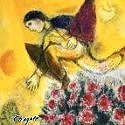
[ The following is related to our Torah reading for this week, Parashat Behar-Bechukotai.... ]
05.18.17 (Iyyar 22, 5777) "If you walk in my decrees and heed my commandments and do them, then I will give you your rains in their season, and the land shall yield its increase, and the trees of the field shall yield their fruit" (Lev. 26:3-4). Note how doing and blessing are linked, and therefore the tzaddik (righteous person) becomes a conduit of goodness to the world itself: the rains will come in their season, the land will yield its increase, and the trees shall yield fruit... The contrapositive also holds however, since there is no real blessing apart from the realm of doing (John 13:17; Matt. 7:21; James 1:5). Simply learning (or "hearing") about Torah but not doing it is mere intellectualism, "head knowledge" but not "heart knowledge." We are to be "doers" of the truth, and not hearers only, deceiving ourselves (παραλογιζόμενοι, literally, "reasoning around the truth") (James 1:22). The truth of the heart is expressed by desire, by choosing, by passion; it is known in the struggle for good, for love, and for healing. We study and learn Torah to do Torah, and all our learning is for the sake of doing (Eph. 2:10). Note the order of the opening verse: "If you walk in my decrees (אִם־בְּחֻקּתַי תֵּלֵכוּ), and heed my commandments (וְאֶת־מִצְוֹתַי תִּשְׁמְרוּ) and do them (וַעֲשִׂיתֶם אתָם)." "Walking" here refers to the life of faith, since the decrees of God (chukkim) are "beyond reason," observed only by a heart that trusts. Faith is therefore the first step of all godly action, the foundation for the commandments. "This is the work of God, to believe in the One whom God has sent" (John 6:29). In other words, the very first work of God is to believe in the reality of His love as manifested in Yeshua our Savior, blessed is He.
Living in the Truth....
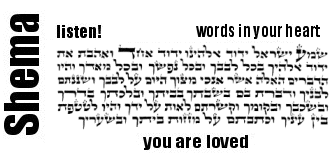
05.17.17 (Iyyar 21, 5777) We have a moral duty, given by the LORD God Himself, to live according to spiritual reality. Confession means "saying the same thing" about ourselves that God says - and that means not only acknowledging our sins, but also affirming that we are loved by Him. Saying that God doesn't love you is a lie every bit as damning as denying His very existence. We gain access to the Divine Presence, we sojourn with him and "share his dwelling," as we live according to the truth: "O LORD, who shall sojourn in your tent? Who shall dwell on your holy hill? He who walks blamelessly and does what is right and speaks truth within his heart" (Psalm 15:1-2).
יהוה מִי־יָגוּר בְּאָהֳלֶךָ מִי־יִשְׁכּן בְּהַר קָדְשֶׁךָ
הוֹלֵךְ תָּמִים וּפעֵל צֶדֶק וְדבֵר אֱמֶת בִּלְבָבוֹ
Adonai · mi · ya·gur · be·a·ho·le·kha · mi · yish·kon · be·har · kod·she·kha
ho·lekh · ta·mim · u·fo·el · tze·dek · ve·do·ver · e·met · bil·va·vo

"O LORD, who shall sojourn in your tent? Who shall dwell on your holy hill?
He who walks blamelessly and does what is right
and speaks truth within his heart."
(Psalm 15:1-2)

Note that the word tamim (תָּמִים). translated "blamelessly," might better be rendered "perfectly," that is, complete in all its parts; where no part is missing. The person who walks perfectly, then, means one who is wholehearted in their faith and trust.... Note that this person does what is right – that is, practices tzedakah and performs good deeds; he uses the "good eye" to bless others. Speaking truth "within the heart" is critical since it implies that the person is sincere, honest, without ulterior motives, and so on... He is a "true" person with a heart that can be trusted. The phrase also implies the person is free from self-deception or the need to pretend to be something he isn't.
We are commanded to keep distant from falsehood (Exod. 23:7; Prov. 4:24). People often lie when they want to manipulate reality to serve their desires. In that sense the lie is similar to lust, since lust seeks its own inner satisfaction regardless of the moral duty of the moment... Lying is also like stealing, since it reports reality to be something it isn't, and that difference robs another person of what is needed to navigate their lives properly... "A worthless person, a wicked man, goes about with crooked speech" (Prov. 6:12). Truth is the foundation of reality, and lying is therefore a form of denial of reality – a dangerous denial - since reality invariably proves self-authenticating (John 3:18). "The lip of truth will stand forever; but a lying tongue is but for a moment" (Prov. 12:19).
The lie is a type of violence. Martin Buber once said, "What is accomplished through lies can assume the mask of truth; what is accomplished through violence can go in the guise of justice, and for a while the hoax may be successful. But soon people realize that lies are lies at bottom, that violence is violence - and that both lies and violence will suffer the destiny history has in store for all that is false."
"There are many ways to offend against the truth. One way is to deny it: the way of the liar. Another way is to keep silent when the truth should be spoken: the way of the coward. At the other end is the cruel use of the truth - pointing out failure when silence is the way of honor, or by distorting 'little truths' for the sake of a supposed capital "T" truth, that is, lying for the sake of an ideology or dogma: the way of the politician" (John Cogley).
Being honest with ourselves is absolutely essential for any sort of authentic spiritual life... "No person is saved except by grace; but there is one sin that makes grace impossible, and that is dishonesty; and there is one thing God must forever and unconditionally require, and that is honesty" (Kierkegaard). Confession means "saying the same thing" about ourselves that God says - and that means living according to spiritual reality...
In heaven there is only the language of truth, and truth is the language of heaven. "If we ask according to his will, he hears us..." (1 John 5:14). This means that words find their traction only in honesty of the heart, in the midst of our deepest need. Only in "fear and trembling" can we talk with God, though when we pray fervently, our words may trail off until we become silent.... But it is there, in the silence of the soul, that we may learn to listen to the Spirit and hear God's voice. When we seek first the kingdom of God, we will lay aside everything else, quiet our hearts, and focus our will. Seeking God in this way is an end in itself, for whatever else we may seek must be subordinated to this greater seeking. "You will seek me and find me, when you seek me with all your heart" (Jer. 29:13).
Moral Sanity and Judgment...
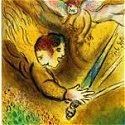
05.17.17 (Iyyar 21, 5777) It is written in our Torah: "You shall not put a stumbling block before the blind (לִפְנֵי עִוֵּר לא תִתֵּן מִכְשׁל); you shall fear God; I am the LORD" (Lev. 19:14). Just as no one can deny the validity of logic by means of argument, so no one can intelligibly deny that truth is necessary.. Indeed, every person intuitively believes that truth exists, since otherwise he or she would not ask any questions or make any statements. In other words, we instinctively presuppose the value and reality of truth whenever we communicate, and we understand that there is an implied social contract to be honest and not to deceive others. Deceitful language puts a "stumbling block before the blind" when it is used to withhold important information from others. Politicians who make mutually exclusive promises to different groups of people are dishonest and cloak their true intentions. The same may be said about people who sell products or services using misleading claims. Those who willfully misdirect others violate the 9th commandment not to bear false witness (Exod. 20:16; 23:1). Such deception is called genevat da'at (גְּנֵבַת דַעַת), or "stealing of the mind," since it defrauds the other person's trust. Misleading people is a violation, then, of both the commandment not to steal and the commandment not to bear false witness. The Torah warns us never to exploit other people's naivete or to take advantage of their good will and trust. Those who use false words and deceitful language to blind the eyes of the gullible will assuredly face judgment, as it is written: "No creature is hidden from God, but everything is naked and exposed to the eyes of him to whom we must render an account" (Heb. 4:13). Lying to others is desecration, profanity, and violence. Those who cause others to stumble will tragically discover that truth will be a stumbling block to them. May God help us to fear Him and to be yashar – upright in our communication with others. May each of us proclaim: "I have chosen the way of truth: I have set my heart on your judgments" (Psalm 119:30).
דֶּרֶךְ־אֱמוּנָה בָחָרְתִּי
מִשְׁפָּטֶיךָ שִׁוִּיתִי
de·rekh · e·mu·nah · va·char·ti
mish·pa·te·kha · shiv·vi·ti

"I have chosen the way of truth;
I have set my heart on your judgments"
(Psalm 119:30)

The Fight for Love...

05.17.17 (Iyyar 21, 5777) "Whatever does not proceed from faith is sin" (Rom. 14:23). Sin is not so much disobedience to an external code of behavior, however, as much as it is abandoning your trust, your identity, and your hope as a beloved child of God. As you believe so you will behave, and as you behave so you believe... Therefore one of the greatest of sins is to forget the truth of who you really are – a prince or princess of God! The great temptation of sin is rooted in the lie that we are unworthy people, that God does not really loves us (just the way we are), that He is disappointed in us, and so on. "Self-rejection is the greatest enemy of the spiritual life because it contradicts the sacred voice that calls us the "Beloved." Being the Beloved constitutes the core truth of our existence" (Nouwen). Forgetting who you are leads to forgetting who the Lord is, just as forgetting who the Lord is leads to forgetting who you are.... Therefore the Lord constantly tells us to remember and not to forget the call of his heart, the message of his love.
Sin seduces people to destroy themselves, since it first of all seeks to disown, impugn, and reject what is most important for spiritual life. The devil seeks to murder and destroy all that we need to be eternally healed... And though we might want to escape from this conflict (or to pretend that it's not really here), the battle is intractably real and must be fully engaged until our redemption is complete (1 Pet. 5:8-9). Meanwhile, spiritual struggles can be downright ugly. Would any one deny that the cross of Messiah was a sacred space - and yet it was precisely from there, from the place of blood and suffering and pain and terror, that the grace, beauty, and strength of God for us would shine forth.
To effectively combat the devil, let us first of all pray to the LORD God Almighty and ask for His power, wisdom, and grace to deal with the evil one's devices and strategies used against us (Eph. 6:11-18; Rom. 13:12, 1 Thess. 5:8; 2 Cor. 10:4-5). Since we are not to be ignorant of his wiles and devices (2 Cor. 2:11), let us particularly ask God to remind us of who we really are in the Messiah, and to give us the power of the Holy Spirit to genuine walk in the truth of our sacred identity as his beloved. Let's ask God to help us practically apply the victory given to us in the resurrection of Yeshua. With God's help, may we be bold to take our place at His banqueting table, assured that we are indeed His dear children...
Being your New Self...
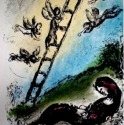
05.16.17 (Iyyar 20, 5777) Our father Jacob's dramatic wrestling match with the Angel retells the story of every person's inner conflict, where two polarities or "sides" of the self oppose each other, and the "higher relation" of the self is therefore divided and in a state of ongoing anxiety... The New Testament speaks about this inner conflict and "double-mindedness" (see Rom. 7:15-8:1; Gal. 5:16), and teaches that healing comes from an altogether different source than the dialectic of the human will. Yeshua explained that in order to see the kingdom of God, a radically new kind of life was necessary: the creation of a higher and "reborn self" that would be united with God by faith (John 3:3; 1 Pet. 1:23). Such spiritual regeneration is experienced as you no longer identify yourself with the struggle of your old nature, but receive your new name as "Israel," the beloved of God. It is your union with Messiah that gives life to your new self. Yeshua both died for your sins (severing your relation to the old "Adamic" nature) and was raised from the dead to make you alive together with him. Trying to "reform" yourself, then, apart from the gift of God is both futile and dangerous, leading you back into the spiral of "the law of sin and death" (תּוֹרַת הַחֵטְא וְהַמָּוֶת). You cannot abuse yourself without disparaging the grace of God, and even if you might lapse into former patterns of thinking, you must turn and "come to yourself" to rediscover the truth of your worth and esteem in God's love. Friend, though you may continue to struggle with your lower nature at times, the essential matter is settled as you trust God for deliverance from all that wounds and fragments you. May you find victory as you are renewed in the spirit of your mind and "put on the new nature" (Eph. 4:23-24).
The resurrection secures your eternal life (חַיֵּי עוֹלָם) in the Messiah. "I AM the resurrection and the life; he who believes in Me shall live even if he dies, and everyone who lives and believes in Me shall never die. Do you believe this?" (John 11:25-26). Yeshua is the "God of the living" (Matt. 22:23-33) who imparts an ontologically new kind of life: "Because I live, you shall live also" (John 14:19). This is not merely a "renewed" life, but rather an entirely new, supernatural, and resurrected life (Phil 3:10). Indeed if anyone is "in the Messiah" he or she is called briah chadashah (בְּרִיאָה חֲדָשָׁה), a "new creation." The old has passed away, behold - all things are made new (2 Cor. 5:17). The resurrection of Yeshua restores all of creation by means of His faithful obedience as the "Second Adam" (Rom. 5:12-19; 1 Cor. 15:45). Our union with the Messiah in His death, burial, and resurrection enables us to "walk in newness of life" (Rom. 6:4). Friend, it is nothing less than the very power that raised Yeshua from the dead dwells in you (Rom. 8:11). The miracle of new life is "Messiah in you - the hope of glory" (Col. 1:27). Ultimately the goal of salvation was not simply to save us from the power of sin and death, but to unite us with God in eternal love.
Note: We are faced with an inner dualism as we struggle to take account of our lives. On the one hand, we need to confess the truth of our radical sinfulness, our depravity, our brokenness, and so on, while on the other we must endure ourselves and find faith that God's blessing nevertheless belongs to us, and that Yeshua gave his life for us and loves us -- despite ourselves. We have to be willing to take God's new name for us and believe that God has transformed our deepest nature for eternal good. We have to be renamed from Jacob to Israel, and yet we know ourselves as both... For more, see this article.
Truth of the Inner Life...

05.16.17 (Iyyar 20, 5777) It is written in our sacred Scriptures, "Behold, you delight in truth in the inward being, and you will teach me wisdom in the secret heart" (Psalm 51:6). Often, however, the truth "of the inward being" (i.e., בַּטֻּחוֹת, in "the covered over parts") must come at the expense of heartache, for surely the heart must ache, tremble, and despair before it can realize and accept the truth about its condition. The truth of the inner life is "existential," meaning that it is known only through the process of suffering through life itself. As Soren Kierkegaard said, "There are many people who reach their conclusions about life like schoolboys: they cheat their master by copying the answer out of a book without having worked the sum out for themselves." Yes, and they cheat themselves, too, since they somehow believe that "knowing the answer" given by another is the same thing as "knowing the answer" of their own inward being... Kierkegaard continues this thought: "The truth is lived before it is understood. It must be fought for, tested, and appropriated. Truth is the way... you must be tried, do battle, and suffer if you are to acquire truth for yourself. It is a sheer illusion to think that in relation to truth there is an abridgment, a short cut that dispenses with the necessity of struggling for it."
הֵן־אֱמֶת חָפַצְתָּ בַטֻּחוֹת
וּבְסָתֻם חָכְמָה תוֹדִיעֵנִי
hen · e·met · cha·fatz·ta · va·tu·chot
uv·sa·tum · chokh·mah · to·di·ei·ni

"Behold, you delight in truth in the inward being,
and you will teach me wisdom in the secret heart"
(Psalm 51:6)

Note that the Hebrew word for "inward parts" (טֻחוֹת) also may refer to the "kidneys" which were metaphorically thought to be hidden "the reins" or the concealed (i.e., te'ach: טִיחַ) source of the will within the person. Interestingly, the Hebrew root for "inward parts" comes from the verb tachah (טָחָה) that means to "shoot with a bow," alluding to the idea of inner Torah as a directive power. God wants purity of the heart – passion, singleheartedness, and earnestness – as we live and practice the truth. God wants "the inner parts," the concealed parts of the soul, to be filled with his Torah, and therefore King David asks God to make him to know wisdom there - in the "secret heart" - so that he might apprehend God's truth and do teshuvah that purifies the heart.
Dangers of Self-Deception...

05.16.17 (Iyyar 20, 5777) "As a man thinks in his heart, so is he" (Prov. 23:7). We often see what we want to see more than what is really there. That's often called "wishful thinking." We overlook much, and we often ignore what might challenge our own preferred interpretations. For example, we may think that we are trusting God for our lives, but we worry, we attempt to control others, we get angry, and so on. We have a blind spot regarding the question whether we really trust God, perhaps because seriously investigating what we really believe seems too threatening (John 16:31-32). After all, what if we don't really believe? What if we struggle to believe? What if we are confused? What does that say about who we are? So we ignore the real problem (namely, lack of trust in God) and continue to think we are something we are not. We fool ourselves and trade a sense of "satisfaction" at the expense of truth. This is a common failing of human nature. During the Nazi years, many ordinary Germans refused to investigate reports of atrocities at the death camps because it was too costly to discover the truth (the same might be said about any patriotic citizens who rationalize the actions of their government regardless of the moral issues involved). By willfully hiding from the facts, we pretend we are not responsible, and therefore we justify passivity in the face of injustice and evil.
Yeshua warned that the time would come when those who kill others will delude themselves into thinking they are doing God a big favor (John 16:2). Think of how massively self-deceived such a thing is as that -- to murder someone as a service to God! Many of the biggest enemies of the truth are often those who think they are doing God such favors.
Lord of the Center...
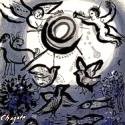
05.16.17 (Iyyar 20, 5777) God's Name is "I-AM-with-you-always," Immanuel (עִמָּנוּ אֵל) - always in the midst of you, your heart, your Center... The LORD is named this way because he is never without his own, and we are who we are in relation to his presence in our lives. Yeshua is not simply the Lord of the past or the Lord of the future, but the Lord of this moment, this "here" and this "now." He is the same yesterday, today, and forever - the breath of life, our sustaining hope, the Shepherd of our souls... Whatever else may come of this day, this is the day that the LORD has made, and we can find peace in God's Presence.
זֶה־הַיּוֹם עָשָׂה יְהוָה
נָגִילָה וְנִשְׂמְחָה בוֹ
zeh · ha·yom · a·sah · Adonai
na·gi·lah · ve·nis·me·chah ·vo

"This is the day that the LORD has made;
let us rejoice and be glad in it."
(Psalm 118:24)
The Bones of Reality...

05.16.17 (Iyyar 20, 5777) From our Torah this week (Behar) we read: "For you are strangers and sojourners (גֵרִים וְתוֹשָׁבִים) with me" (Lev. 25:23). When we are strangers to this world, we reside with God: we are called residents of heaven. To be a stranger to this world is a great blessing, since it means we identify our home in the heart of God. By extension, reality is measured by proximity to the Eternal, and the material world - when regarded as an end in itself - is nothing but an illusion, since it cannot exist apart from the sustaining power of God (Heb. 1:3; Col. 1:16-17; Rev. 4:11). The sages note that in Hebrew there is no language of categorical ownership, since all things are conditioned by time. We say yesh li (יש לי) - "there is to me" (for this time) rather than "I have" or own. Ownership is related to the "bone" (עֶצֶם) of something, its inner structure and essence. God alone is koneh shamayim va'aretz (קנֵה שָׁמַיִם וָאָרֶץ), the Owner of Reality (Gen. 14:9). "For from him and through him and to him are all things. To him be glory forever. Amen" (Rom. 11:36).
לְךָ יָאֶה אֲדנֵינוּ וֵאלהֵינוּ
לְקַבֵּל אֶת הַכָּבוֹד וְהַיְקָר וְהַגְּבוּרָה
כִּי אתָּא בָּרָאתָ הַכּל
וּבִרְצוֹנְךָ הָיוּ וְנִבְרְאוֹ
le·kha · ya·eh · a·do·nei·nu · ve·lo·hei·nu
le·ka·bel · et · hak-ka·vod · ve'ha-ye·kar · ve'ha-ge·vu·rah
ki · at·tah · ba·ra·ta · ha-kol
u·vir·tzon·kha · hai·yu · ve'niv·re·u

"You are worthy, O Lord and our God,
to receive the glory and the honor and the power:
for You have created all things,
and for thy pleasure they are and were created."
(Rev. 4:11)

Hebrew Study Card
Torah of Rest...

[ The following is related to our Torah reading for this week, Parashat Behar-Bechukotai.... ]
05.15.17 (Iyyar 19, 5777) In our Torah portion for this week (i.e., Behar-Bechukotai), the LORD gave the people instructions about how they were to manage the Promised Land once they finally entered it. Instead of commanding the people to work hard to sustain themselves, however, God counterintuitively gave them laws of rest – of releasing their hold on the land (see Lev. 25:1-7). During the "Sabbatical years" (shemitah) the land was to lie fallow, and the people could eat only what was produced naturally, without any farming or organized harvesting. "Letting go" of the land required the people to trust that God was in control of nature's creative processes, and to acknowledge that the process of growth is mysterious and divine. As Yeshua said: "The Kingdom of God (מַלְכוּת הָאֱלהִים) is like someone who spreads seed on the ground. He goes to sleep and gets up, night and day, and the seed sprouts and grows, though he does not know how. By itself (αὐτομάτη, i.e., "automatically") the soil produces a crop, first the stalk, then the head, then the full grain in the head. And when the grain is ripe, he comes in with his sickle because the harvest has come" (Mark 4:26-29). In other words, the "ordinary" process of the growth of a seed is miraculous and is a gift from above. The Torah of the Sabbatical Year (תּוֹרַת שְׁמִטָה) teaches us that creativity and fruitfulness requires that we let go and leave the outcome to God.
Year of Jubilee...

05.15.17 (Iyyar 19, 5777) Our Torah portion this week (parashat Behar) begins with the commandment that an Israelite farmer must let his land remain fallow every seventh year. This is called the "Sabbatical year" (i.e., shemitah: שְׁמִטָה), and the inhabitants of the land were permitted to glean whatever the farmland produced naturally. In addition, the people were told to count seven cycles of seven years - a total of 49 years - and to mark the arrival of the fiftieth year with blasts of the shofar on the Day of Atonement (i.e., Yom Kippur). This fiftieth year would be a time of "Jubilee" (i.e., yovel: יוֹבֵל) – a year of "release" for the land and all its inhabitants. All slaves would be set free, debts would be canceled, and the stewardship of the land would revert to its original titleholders.
In this connection, how do you determine whether a given year is a Sabbatical year (i.e., shemittah)? We take the current Jewish year and divide by seven; if there is no remainder, it is a Shemitah year; otherwise it is not (note that the Jewish year begins on Rosh Hashanah, on Tishri 1, in the fall). For example this year (5777) is not a Sabbatical Year since 5777 divided by 7 is 825.28571. The Jubilee year (yovel) of course follows the seventh of the seven year cycles (i.e., 7 x 7 + 1), though there are some questions about which iteration (1st, 2nd, ... 7th) is currently active.
The Jewish Encyclopedia notes that there is a difference of opinion in the Talmud as to whether the jubilee year was "included in or excluded from the forty-nine years of the seven cycles." The majority of sages decided that the Jubilee Year was an intercalation (addition), that followed the seventh Sabbatical year, making two fallow years in succession (thus the Jubilee would be on the 50th year, not unlike the 50 day count of days from Passover to Shavuot). After both the last iternation of the Shemitah and the Jubille Year had passed, the next 50 year cycle began. That the Sabbatical year was observed during the existence of the Second Temple is evident from the history of the Maccabees (1 Macc. vi. 51, 55).
Remembering Jerusalem...
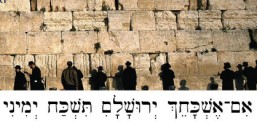
[ Yom Yerushalayim, or Jerusalem Day, is observed May 23rd and 24th this year.... ]
05.15.17 (Iyyar 19, 5777) In Israel, "Jerusalem Day" (i.e., Yom Yerushalyim: יום ירושלים) commemorates the re-unification of old city of Jerusalem on June 7th, 1967 during the Six Day War. In 1968 the Chief Rabbinate of Israel declared Iyyar 28 to be a minor holiday to thank God for answering the 2,000-year-old prayer of "Next Year in Jerusalem" (לשנה הבאה בירושלים). On March 23, 1998, the Knesset passed the Jerusalem Day Law, making it a national holiday. This year, "Jerusalem Day" runs from Tuesday, May 23rd (after sundown) through Wednesday, May 24th (until sundown). Sha'alu shelom Yerushalayim (Psalm 122:6).
אהֵב יְהוָה שַׁעֲרֵי צִיּוֹן מִכּל מִשְׁכְּנוֹת יַעֲקב - "The LORD loves the gates of Zion more than all the dwelling places of Jacob. Glorious things of you are spoken, O city of God. Selah (Psalm 87:2-3). The Hebrew word "Zion" (i.e., tzion: צִיּוֹן) is mentioned over 160 times in the Scriptures. That's more than the words faith, hope, love, and countless other key words of our faith... And since Zion is a poetic form of the word "Jerusalem" (יְרוּשָׁלַםִ), the number of occurrences swells to nearly 1,000! Since it's the most frequently occurring place name in all the Scriptures, it's no overstatement to say that God himself is a Zionist: "Out of Zion, the perfection of beauty, God shines forth" (Psalm 50:2). "The LORD loves the gates of Zion more than all the dwellings of Jacob. Glorious things are said of you, O City of God" (Psalm 87:2-3). Indeed, Yeshua called Jerusalem the "City of the great King" (Psalm 48:2; Matt 5:35): It is the place (הַמָּקוֹם) where He was crucified, buried, resurrected, and ascended to heaven; and is it furthermore the place where He will return to earth (Zech. 14:1-9).
In Psalm 122:6 it is written, שַׁאֲלוּ שְׁלוֹם יְרוּשָׁלָםִ - sha'alu shelom Yerushalayim - "Pray for the peace of Jerusalem," a phrase that reveals prophetic truth about our Savior and Messiah. The word sha'alu (שַׁאֲלוּ) means "you ask" (as in ask a sheilah, a question), shalom (שׁלוֹם) is the name of Yeshua, the Prince of Peace (i.e., Sar Shalom: שַׂר־שָׁלוֹם), and Jerusalem means "the teaching of peace" (Jeru- comes from the same root as the word Torah [ירה], which means "teaching"). The phrase sha'alu shelom Yerushalayim can therefore be construed, "ask about the Prince of Peace and His Teaching." Yeshua is indeed the rightful King of Jerusalem (Matt. 5:35) who is coming soon to reign over all the earth.
שַׁאֲלוּ שְׁלוֹם יְרוּשָׁלָםִ
יִשְׁלָיוּ אהֲבָיִךְ
sha·a·lu · she·lom · ye·ru·sha·la·yim
yish·la·yu · o·ha·va·yikh

"Ask for the well-being of Jerusalem;
May those who love you be at peace" (Psalm 122:6).
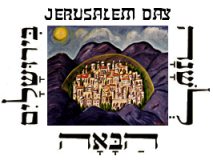
Download Study Card
Descrying the End of Days...

05.15.17 (Iyyar 19, 5777) We are living in a decaying and moribund world, and the great age of apostasy will soon be coming to an end. The Apostle Paul provided a list of nineteen characteristics that would mark the heart of people during this final period of human history. "People will be lovers of self, lovers of money, proud, arrogant, abusive, disobedient to their parents, ungrateful, unholy, heartless, unappeasable, slanderous, without self-control, brutal, not loving good, treacherous, reckless, swollen with conceit, lovers of pleasure rather than lovers of God, having the appearance of godliness, but denying its power" (2 Tim. 3:2-5). Noteworthy in this litany is the phenomena of what might be called "misdirected love." People will be "lovers of themselves," "lovers of money," "lovers of pleasure more than lovers of God," and "not lovers of good." Loveless self-centeredness will be the "norm" of the day.... And even though he was being prophetic (i.e., speaking of the End of Days), the Apostle linked these nineteen middot ra'ot (evil attributes) to the character of false teachers presently in the church, and warned his protege Timothy that Satan can masquerade as an "angel of light." Therefore we are to have nothing to do with those who pervert the gospel message (2 Tim. 3:5). These false teachers would come to an end just as did "Jannes and Jambres" (Paul here cites a midrash regarding the identity of two of the Egyptian magicians who opposed Moses and whose rods were swallowed up by Aaron's rod in Exod. 7:11-12).
For more on this topic, see "Perilous Times and the End of Olam HaZeh."
The Ascension of Messiah...
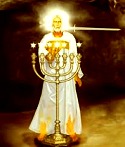
[ Saturday, May 20th after sundown marks the 40th day of the Omer Count... ]
05.15.17 (Iyyar 19, 5777) We are in the midst of Sefirat Ha-Omer (the "Counting of the Omer"), a 49 day countdown that runs from Nisan 16 through Sivan 5. The first day of the omer count begins on the second day of Passover, and the last day occurs the day before Shavuot ("Pentecost"). On our Gregorian calendars, these dates run from April 11th through May 29th this year. This is a countdown period leading to the giving of the Torah at Sinai and the giving of the Holy Spirit to Yeshua's disciples...
 |
This coming Saturday May 20th after sundown (Iyyar 25) marks the 40th day of the Omer Count (i.e., Mem B'Omer), the time associated with the ascension of Yeshua back to the heavenly realm (Luke 24:44-53; Acts 1:9-11; Eph. 4:8). A thousand years before the birth of our Moshiah (מוֹשִׁיעַ), King David prophesied of the ascension when he announced the Lord's enthronement at the right hand of God (Psalm 110:1; Matt. 22:41-46; 26:64). Recall that Yeshua told His followers that it was good that he would leave them, so that the Holy Spirit (רוּחַ הַקּדֶשׁ), the "Comforter" or "Advocate" (παράκλητος), would be given to them. "But I tell you the truth, it is for your advantage that I am going away. For if I do not go away, the Advocate (ὁ παράκλητος) will not come to you, but if I go, I will send him to you" (John 16:7). Notice that the word translated as "advantage" here is the Greek word συμφέρω (from σύν, "with" and φέρω, "to carry"), which suggests that we would be given power that "carries us" with the Lord during the trials of this life... Amen, Lord. And may our hearts cry out this very hour: Bo, Ruach Elohim: "Come, Holy Spirit..."
Note: For more on this, see "Mem B'Omer and the Ascension of Yeshua."
Parashat Behar-Bechukotai...
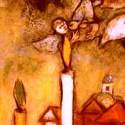
05.14.17 (Iyyar 18, 5777) This week we will read the final two portions of the great Book of Leviticus (i.e., sefer Vayikra), namely, parashat Behar and Bechukotai (בהר־בחקתי). Like a father pities his children, so the LORD pities those who fear Him. Chazak, chazak, v'nitchazek - "Be strong, be strong, and may we be strengthened!"
Why is it, the sages asked, that God bypassed all of the world's great and lofty mountains and chose to give His Torah on the obscure mountain of Sinai? Because God's Spirit (רוח) rests with the lowly, the humble of heart, as it says: "For thus says the One who is high and lifted up, who inhabits eternity, whose name is Holy: "I dwell in the high and holy place, and also with him who is of a contrite and lowly spirit (דַּכָּא וּשְׁפַל־רוּחַ), to revive the spirit of the lowly (רוּחַ שְׁפָלִים), and to revive the heart of the contrite (לֵב נִדְכָּאִים)" (Isa. 57:15). Humility (ענוה) is therefore one of the greatest of middot ha-lev (heart qualities).
The LORD reveals Himself to the contrite and the lowly of spirit, that is, to those who understand their own nothingness and live in utter dependence on Him. Notice that the word dakka ("contrite") refers to being crushed to the very dust, as Yeshua was verily crushed for our iniquities (Isa. 53:10). From the point of view of our dependence on God for salvation, dakka refers to our contrition as we turn to God in genuine teshuvah... Pride, arrogance, and self-righteousness are antithetical to the awareness of God in the truth.
Note: Shavuah tov, friends. Please pray for this ministry... Things have been hard for us lately, so please ask our Lord for his favor and grace for this work to continue. Thank you.
Cycles of Time...
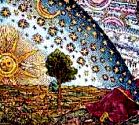
[ The following is related to our Torah reading for this week, Parashat Emor. Shabbat Shalom! ]
05.12.17 (Iyyar 16, 5777) Instead of thinking of time as a linear sequence of events (i.e., the measurement of linear, progressive motion), Jewish thinking tends to regard it in terms of a spiral or "helix," with a forward progression delimited by an overarching (and divine) pattern that recurs cyclically throughout the weeks, months, and years of life. This can be seen in the Hebrew language itself. Some of the sages note that the Hebrew word for "year" - shanah (שָׁנָה) - shares the same root as both the word "repeat" (שָׁנָה) and the word "change" (שִׁנָּה). In other words, the idea of the "Jewish year" implies ongoing "repetition" - mishnah (מִשְׁנָה) - or an enduring "review" of the key prophetic events of redemptive history as they relived in our present experiences... (The idea that the events of the fathers were "parables" for us is expressed in the maxim: מַעֲשֵׂה אֲבוֹת סִימָן לַבָּנִים / ma'aseh avot siman labanim: "The deeds of the fathers are signs for the children.") The Jewish year then repeats itself thematically, but it also changes from year to year as we progress closer to the coming Day of Redemption... We see this very tension (i.e., constancy-change), for example, in the "dual aspect" of the ministry of Yeshua our Messiah. In His first advent Yeshua came as our Suffering Servant and thereby fulfilled the latent meaning of the spring holidays, and in His second advent He will fulfill the latent meaning of the fall holidays. Nonetheless, we still commemorate both the "type and its fulfillment" every year during Passover by extending the ritual of the Seder to express the reality of Yeshua as the world's "Lamb of God," just as we commemorate the fall holidays in expectation of His rule and reign as our King....
None of this is meant to suggest, by the way, that there isn't an "end point" in the process - a Great Day in which we will be with God and enjoy His Presence forever... The idea of the "cycles" of time, or "timeless patterns in time," suggests, however, that the "seed" for our eternal life with God has already been sown - and was indeed foreknown even from the Garden of Eden, despite the fact that we presently groan while awaiting the glory of heaven.
May that Day come soon, and in our time: Maranatha! Shabbat Shalom, dear friends...
The Appointed Times...

[ The following is related to our Torah reading for this week, Parashat Emor. Shabbat Shalom! ]
05.12.17 (Iyyar 16, 5777) Our Torah portion this week (parashat Emor) lists the eight main mo'edim (מוֹעֲדִים) -- the "appointed times" of the LORD given in the Jewish Scriptures. These special times are also referred to as mikra'ei kodesh (מִקְרָאֵי קדֶשׁ), "times in which holiness is proclaimed" (Lev. 23:2). Note that this is the first time that the Torah reveals a comprehensive description of the festivals of the year, including the following special times:
- The Sabbath- weekly observance of Shabbat that commemorates God as the Creator of the world. According to the sages, Shabbat is the most important of the appointed times, even more important than Yom Kippur and the Ten Days of Awe. There are 54 weekly Sabbaths in a "leap year" and 50 for regular years...
- Pesach (Nisan 15), also called "Passover." This denotes the redemption from death that comes from the sacrificial blood of the Lamb of God...
- Unleavened Bread (Nisan 15-22); note that the Counting of the Omer is first mentioned in this section of Torah (Lev. 23:9-16). This denotes the sanctification of the people of God, the "crossing over" into the realm of Promise...
- Firstfruits (Nisan 17), also called Reishit Katzir. This is the time of the resurrection of Messiah and the victory of Life over the powers of hell and death.
- Shavuot (Sivan 6), also called "Pentecost." This marks the giving of Torah at Sinai and the giving of the Ruach (Spirit) at Zion. It is the advent of the New Covenant for all nations, tribes, and tongues...
- Yom Teru'ah (Tishri 1), also called "Rosh Hashanah" (note that this is the first time this is revealed in Torah). This marks the start of the final "week of years" of the End of Days and time of worldwide judgment... the "Great Tribulation."
- Yom Kippur (Tishri 10) also called the "Day of Atonement(s)." This denotes the national restoration of the Jewish people at the end of the Tribulation Period.
- Sukkot (Tishri 15-22) also called Tabernacles (note that this is the first time the commandments to dwell in a Sukkah and to wave the arba minim (four species) are mentioned in the Torah). This denotes the Millennial Kingdom and Sukkah of God established as Zion.
Notice that there is a restatement of the commandment to leave food for the poor and the stranger (pe'ah, leket, etc.) that appears in the midst of the list of the various holidays (see Lev. 23:22), which the sages said was intended to remind us to help those in need, especially during these times. Hence we see that giving of tzedakah is a regular part of the Jewish holidays (e.g., giving ma'ot chittim [מַעוֹת חִטִּים] "money for wheat" during Passover, matanot la'evyonim [מַתָּנוֹת לָאֶבְיוֹנִים] for Purim, and so on). The sages ask, "Why did the Torah place the mitzvah of helping the poor while speaking about the holidays and their particular sacrifices? To teach us the greatness of charity: 'God credits whoever gives charity to the poor as if they built the Holy Temple and presented offerings therein to God.' Giving a gift to the poor is giving a gift to God Himself!"
Since there are at least 50 weekly Sabbaths in a Jewish year in addition to the seven prescribed holidays (not to mention Rosh Chodesh and the other holidays such as Purim, Chanukah, Israel Independence Day, etc.), it is no wonder that the Scriptures declare: "A person with a cheerful heart has a continual celebration" (Prov. 15:15). The moedim are times to give thanks to the LORD for all He has done.... Rejoice in the Lord always!
For more on this important topic, see: "Appointed Times: Further thoughts on Emor."
Walking Uprightly...

[ "You shall not profane my Holy Name, that I may be sanctified among the people of Israel. I am the LORD who sanctifies you." - Lev. 22:32 ]
05.12.17 (Iyyar 16, 5777) In our Torah we read, "Keep yourselves away from a false matter" (Exod. 23:7). In this connection note that the Hebrew word for falsehood (or lie) is sheker (שֶׁקֶר), which can be rearranged to spell kesher (קֶשֶׁר), meaning a band, gang, or group of people... The power of the lie is often found in the "group" rather than in the individual, and if enough people in a group repeat something untrue, eventually the individual's conscience will be overruled and the truth will be lost... This is a common methodology (i.e., "the Big Lie") regularly employed by the mass media and political manipulators for purposes of political propaganda...
Regarding this the sages comment that we should never act in a way that will move us to "hide," and that includes hiding within the anonymity of the crowd... It takes moral courage to stand for your convictions, but the power of the crowd is to reduce you into just one of its members, an insignificant voice that is drowned out by the clamor of stupid instincts governed by the lowest common denominator of the mob.
Each of us must personally and individually strive to be yashar (יָשָׁר) - upright and honest, and free from the complications and devious speech that attends to lies. We are to be "simple" (תָּמִים) with the LORD our God (Deut. 18:13), which requires that we are first willing to be rigorously honest with ourselves. "No person is saved except by grace; but there is one sin that makes grace impossible, and that is dishonesty; and there is one thing God must forever and unconditionally require, and that is honesty" (Kierkegaard).
In this connection we note that the midrash teaches that the Hebrew word for "truth" (i.e., emet: אֱמֶת) is composed of the first, middle, and last letters of the alphabet, whereas the three letters that spell "falsehood" (i.e., sheker: שֶׁקֶר) all stand next to one another. Truth creates a firm foundation, secure, strong, and trustworthy, while falsehood is unstable. As it is written, "truth stands forever, falsehood has no legs." In other words, the way of truth is "self-authenticating" and made secure, whereas the way of falsehood is "unlivewithable" and made unsteady...
Sanctity of our Words...

[ "You shall not profane my Holy Name, that I may be sanctified among the people of Israel. I am the LORD who sanctifies you." - Lev. 22:32 ]
05.12.17 (Iyyar 16, 5777) The Torah states that we are not to be deceptive people, and that whoever makes a vow or takes an oath "shall not break his word" (לא יַחֵל דְּבָרוֹ). Notice that the word translated "break" comes from the root chalal (חָלַל) which means to profane or make unholy. This is the same root used in the phrase chillul Hashem (חִלוּל הַשֵּׁם) which means to desecrate the Name of the LORD: "And you shall not profane (חָלַל) My holy name; but I will be sanctified (קָדַשׁ) among the children of Israel: I am the Lord who sanctifies you" (Lev. 22:32). Since it is chillul HaShem to break your word, keeping your word is a form of kiddush HaShem (קִדּוּשׁ הַשֵּׁם), "sanctifying the Name of the LORD."
The matter of truth-telling is linked with the soul (i.e., nefesh: נֶפֶשׁ). An oath is considered a "bond" or a binding obligation upon the soul (lit., "a bond on his soul," אִסָּר עַל־נַפְשׁוֹ). This statement leads to the question about the relationship between our words and the state of our souls... Whenever we make a declarative statement of any kind (not just vows or oaths) we are attesting to the truth of what we say, and the assumption is that we are not deceiving others with our words. There is an implied "social contract" we have in all our communications with others... The truth bears its own internal witness within our hearts, and speaking lies violates the inner peace and sanctity of the soul: The polygraph works because the soul cannot tolerate the lie (unless, of course, the conscience is utterly seared).
In Genesis 2:7, the Scriptures describe the creation of man: "Then the LORD God formed (יֵצֶר) the man of dust from the ground and breathed (נָפַח) into his nostrils the breath of life (נִשְׁמַת חַיִּים), and the man became a living soul (נֶפֶשׁ חַיָּה)." The word yetzer ("formed") refers to something shaped, like pottery fashioned by the hand of a potter. Just as a potter purposes a shape before forming an object, so God intended the image of man. The sages use the analogy of a glassblower who creates a glass vessel. Just as a glassblower blows into a tube to form a vessel from molten glass, so the breath (i.e., neshamah: נְשָׁמָה) that comes from the LORD functions as spirit (רוּחַ) that forms the human soul (i.e., nefesh: נֶפֶשׁ). The Targum states that God breathed into Adam the ability to think and to speak. In other words, thought and speech are two primary characteristics of the image (tzelem) and likeness (demut) of God. Our use of words are directly linked to the "breath of God" within us, and therefore breaking our word defaces the image of God within us....
The LORD God of Israel is faithful and true (Deut. 7:9; Psalm 12:6; Matt. 24:35). He always keeps His word and therefore He wants us to do so as well. Indeed, Yeshua Himself is called the Word of God (דְּבַר הָאֱלהִים). As image bearers of God, our words likewise are to carry deep meaning and sanctity. Just as God's words are trustworthy, true, and lifegiving, so should be our words and communication. The sages say that the words we speak - whether good or bad - call for a response in the realm of spirit. This is hinted at by the Hebrew word for "thing" (i.e., devar: דָּבָר), which also means "word." Listen to the words of your heart and understand that they are devarim, "things" that are defining the course of your life right now. Our thoughts and words "exhale" the breath of God that was given to each of us. In a very real sense they are "prayers" we are constantly offering...
Note: If you are reborn from God, you have become God's "child," and God has promised to never disown you, no, not ever (see John 6:37; 10:28-30;)... As it is written in our Scriptures: "And this is the promise that he made to us -- "chayei olam," eternal life" (1 John 2:25). Understand that this eternal life is not merely immortality of the soul or the perpetuity of existence after physical death (for all people have that), but instead means being ontologically healed from the "sickness unto death" and being restored to a real relationship of peace and acceptance with God through Yeshua (John 14:6). There is no "eternal life" apart from a relationship with the Author and Source of Life; God has the prerogative in all things... There's nothing you can do to effect eternal life other than receiving it by genuine trust. It's that simple -- and therefore it's that difficult. Shalom.
Living in Perilous Times...

05.12.17 (Iyyar 16, 5777) "But you must know this: in the last days perilous times shall come" (2 Tim. 3:1). Notice that this knowledge is not optional, since the Greek verb is imperative (i.e., Τοῦτο δὲ γίνωσκε - "this you must know..."). In order to heed this commandment, then, we need to understand some of the language being used in this verse. The Greek phrase "in the last days" (ἐν ἐσχάταις ἡμέραις) refers to the prophesied "End of Days," sometimes called acharit ha-yamim (אַחֲרִית הַיָּמִים) in Hebrew. Eschatos (ἔσχατος) refers to the end point of a sequence, indicating its outcome or final expression. In the context of Paul's letter, then, the "last days" ultimately refers to the period of the Great Tribulation (צָרָה גְדוֹלָה) just before Yeshua returns to establish His Kingdom in Zion.
In traditional Jewish eschatology, human history is usually divided into three distinct epochs of 2,000 years. The period of "tohu" (יְמֵי תּהוּ) occurred from the time of the fall of Adam until the call of Abraham; the period of "Torah" (יְמוֹת תּוֹרָה) occurred from Abraham until the time of the destruction of the Second Temple, and the period of the "Messiah" (יְמוֹת הַמָּשִׁיחַ) refers to the time when the Messiah could appear before the Kingdom is established in Zion:
 |
According to many of the sages, the time immediately preceding the appearance of the Messiah will be a time of testing (nisayon) in which the world will undergo various forms of tribulation, called chevlei Mashiach (חֶבְלֵי הַמָּשִׁיחַ) - the "birth pangs of the Messiah" (Sanhedrin 98a; Ketubot, Bereshit Rabbah 42:4, Matt. 24:8). Some say the birth pangs are to last for 70 years, with the last 7 years being the most intense period of tribulation -- called the "Time of Jacob's Trouble" / עֵת־צָרָה הִיא לְיַעֲקב (Jer. 30:7). The climax of the Great Tribulation is called the great "Day of the LORD" (יוֹם־יהוה הַגָּדוֹל) which represents God's wrath poured out upon a rebellious world system. On this fateful day, the LORD will terribly shake the entire earth (Isa. 2:19) and worldwide catastrophes will occur. "For the great day of their wrath has come, and who can stand?" (Rev. 6:17). The prophet Malachi likewise says: "'Surely the day is coming; it will burn like a furnace. All the arrogant and every evildoer will be stubble, and that day that is coming will set them on fire,' says the LORD Almighty. 'Not a root or a branch will be left to them'" (Mal. 4:1). Only after the nations of the world have been judged will the Messianic kingdom (מַלְכוּת הָאֱלהִים) be established upon the earth. The remnant of Israel will be saved and the 1000 year reign of King Messiah will then commence (Rev. 20:4). For more information about this, see "As the Day Draws Near."
Notice that Paul states that the time before the End of Days would be perilous (χαλεπός). In the entire New Testament, the only other place we find this Greek word is in Matthew 8:28, where it describes fierce demonic activity. Indeed, the word "perilous" likely comes from a Greek verb (χαλάω) that means "to let down from a higher place to a lower," thereby creating a sort of spiritual "chasm" or rift, which again suggests that Satan's activity will be increased upon the earth. In the "End of Days," then, a wave of fierce demonic activity will appear upon the earth that will menace and terrorize others.
Are we then to live in fear of these things? No. "There is no fear in God's love" (φόβος οὐκ ἔστιν ἐν τῇ ἀγάπῃ). We are given truth and grace to help us navigate our difficult situation, friends: "Understand this, that in the last days perilous times shall come" (2 Tim. 3:1). The Greek word translated "times" in this verse (i.e., καιροὶ) is also translated as "appointed times" (מוֹעֲדִים) throughout the Scriptures. In other words, God has appointed this time to be one of judgment upon the earth, and we are therefore forewarned so that we can speak the truth and offer healing to the world... God will never leave us nor forsake us; He will walk with us through the waters, and through the fires, chaverim (Isa. 43:2). Our Good Shepherd knows how to calm the storms around us...
For more on this topic, please see "Perilous Times and the End of Olam HaZeh."
Comfort ye My People...
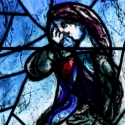
05.11.17 (Iyyar 15, 5777) "The LORD ... has sent me to bind up the brokenhearted, to proclaim liberty to the captives, and the opening of the prison to those who are bound" (Isa. 61:1). Note here that Messiah our Savior (משיח מושיענו) was explicitly sent to "bind up" the wounds of the brokenhearted. The Hebrew verb chavash (חָבַשׁ), "to bind up," can also mean to govern or to restrain... The LORD is near to the nishbar lev, the one with a broken heart. He restrains its woundedness and salves its hurt (Psalm 34:18). The Hebrew word "lev" (לב) metaphorically refers to our inner life, that is, our affections, mind, and will. This is revealed in the letters of the Hebrew word itself: the Lamed (ל) depicts a "staff" used to direct something (i.e., the will), and the Bet (בּ) depicts the "house" of the physical body. Lev then represents our inner life of thought and feeling expressed in our actions. Those who are broken in heart – the nishberei lev (נִשְׁבְּרֵי־לֵב) – have discovered that they cannot control their own lives, that they are inwardly "shattered," and therefore need divine help. Yeshua comes to those who are "poor in spirit" and viscerally humbled by their sin; He is near to those cut to the heart, to those who have bruised and wounded spirits and who live in great pain. It is for these the Savior rises to bring comfort....
This seems to be the divine pattern. "Truly, truly, I say to you, unless a grain of wheat falls into the earth and dies, it remains alone; but if it dies, it bears much fruit" (John 12:24). The hard "outer shell" of the seed must be broken so that the life of the Spirit can come through... Plainly put, God (and only God) can "deconstruct" the self so that life's priorities, focus, and passions are redirected to Him alone, the true Source of life.
For more see: "The Spirit and Freedom: Further Thoughts on Shavuot."
Endurance for Difficult Days...

05.11.17 (Iyyar 15, 5777) In times of severe testing people often do not need further teaching, but rather "endurance," or what the New Testament calls hupomone (ὑπομονή), a word that means "remaining [μένω] under [ὑπο]" the Divine Presence while being tested. Suffering people do not need moral platitudes from others, but only the will to believe, the resolution to stay constant, and to ability breathe out simple prayers for help to the LORD: "God have mercy..." "Help me, O God..." "I need Thee, O Lord..." When we receive grace to faithfully suffer, we hear the Spirit whispering back to us: "Be not afraid..." "Live in me..." "Walk in the light..." "I am with you always..." "You are loved..."
If it's been difficult lately, remember "this too shall pass," and the story ends well with you... Affirm within your heart that regardless of how you may presently feel, your emotional life is ultimately grounded in the Presence of God... As George Mueller once affirmed, "Be assured – if you walk with Him and look to Him, and expect help from Him, He will never fail you."
Refuge of Teshuvah...

05.10.17 (Iyyar 14, 5777) The message of teshuvah (repentance) is one of healing. As is written in our Torah, "Guard well your souls..." (וְנִשְׁמַרְתֶּם מְאד לְנַפְשׁתֵיכֶם) [see Deut. 4:15]. The Hebrew grammar of this verse is a bit unusual, since the verb shamar (שָׁמַר), meaning to "guard" or to "keep," is written in the passive voice (niphal), i.e., "Let yourselves be guarded well..." If we open our hearts to heed or listen to the truth of God - if we let go and surrender to God's will for our lives - we will be protected from the snares of idolatry. "Know therefore today, and lay it to your heart (וַהֲשֵׁבתָ אֶל־לְבָבֶךָ), that the LORD is God in heaven above and on the earth beneath -- there is no other" (Deut. 4:39). When you surrender from the heart you will understand that "the LORD is your Guard" (יְהוָה שׁמְרֶךָ); the LORD is yishmor et nafshekha - "the One who guards your life" (Psalm 121:5,7).
Our Daily Deliverance...

05.10.17 (Iyyar 14, 5777) Just as we ask God for daily bread (לֶחֶם חֻקֵּנוּ), so we ask him for our daily deliverance: "Lead us not into temptation, but deliver us from evil" (Matt 6:13). Note that the term translated "evil" in many translations ("deliver us from evil") is a substantive rather than an adjective, i.e., τοῦ πονηροῦ, the evil one... "Give us this day our daily deliverance from the evil one...." Our daily bread and our daily deliverance are connected with our decision to "choose life" (בַּחַרְתָּ בַּחַיִּים) -- and to always choose life -- even in moments we find difficult, distressing, and even when we might wish that we were no longer living... Choosing life means refusing to escape reality by evading the significance of our choices; it means finding the will to regard life as worthy; it implies that we will eat our bread in trust that the Lord is at work even in the darkest of hours (Passover occurred at midnight)... Choosing life means refusing to eat the fruit of death and to seek Yeshua, the Tree of Life. We live one day at a time; we only have today. We are given daily bread for this hour of our need. Today is the day of your deliverance - if you are willing to walk in it. Therefore, the Spirit of the Living God cries out, "Choose life and live!"
"Do not be grieved [even over yourself], for the joy of the LORD (חֶדְוַת יְהוָה) is your strength" (Neh. 8:10). Affirming the love, faithfulness, compassion, and salvation of God is a powerful way to defeat the enemy of our souls, who regularly entices us to despair. King David constantly asked God to help him in his spiritual struggles. "Though I walk in the midst of trouble (בְּקֶרֶב צָרָה), you preserve my life; you stretch out your hand against the wrath of my enemies, and your right hand delivers me" (Psalm 138:7). "For the enemy has pursued my soul; he has crushed my life to the ground; he has made me sit in darkness like those long dead. Therefore my spirit faints within me; my heart within me is appalled" (Psalm 143:2-3). Despite whatever struggle we may face, "the LORD is near to the brokenhearted and saves the crushed in spirit (Psalm 34:18). Indeed, the Lord God is far greater than your heart's sin and will one day entirely deliver you of sin's effect and influence. Amen.
Wounded Healers...

05.10.17 (Iyyar 14, 5777) Ironically those defects that disqualify us as priests can be transformed (by grace) into compassion for others, and this can enable us to reach out to God in the midst of our flawed existence... After all, the deepest role of the priest is to draw others near to God, but this requires empathy and awareness of the needs of others. Therefore God clothed himself with our frailty, our infirmities, and the brokenness of our sin in order to redeem us in Yeshua. As it is written, we have a high priest who is able to sympathize (συμπαθέω) with our weaknesses (Heb. 4:15). The priest of the New Covenant is a mediator through through poverty of spirit and mourning (Matt. 5:3-8). Just as Joshua the high priest was graciously given robes of righteousness in exchange for his filthy garments (Zech 3), so we are given an imputed righteousness that comes through trusting in "the One who justifies the ungodly" (Rom. 4:5). "For our sake God made Him (i.e., Yeshua) to be sin who knew no sin, so that in him we might become the righteousness of God" (2 Cor. 5:21). This is a righteousness that is "apart from the law, though the law and prophets testified of it; namely, the righteousness of God given through the faithfulness of Yeshua the Messiah" (Rom. 3:21-22). Our present groaning for the complete deliverance is a gift given by the Spirit of God crying out within our hearts (Rom. 8:22-23).
C.S. Lewis once remarked, "God doesn't love you because you are good, but He will make you good because He loves you." This goodness is the miraculous inner working of an imparted godliness, the divine gift of a new heart and spirit (Ezek. 36:26). Awaken to your eternal perfection in the world to come: "You shall be perfect even as your heavenly Father is perfect" can be read as a prophecy. Do not give up, friends; do not succumb to despair. We must learn to endure ourselves and believe in the healing to come. "Do not lose heart. Though our outer self is wasting away, our inner self is being renewed day by day. For this light momentary affliction is preparing for us an eternal weight of glory beyond all comparison, as we look not to the things that are seen but to the things that are unseen. For the things that are seen are transient, but the things that are unseen are eternal" (2 Cor. 4:16-18). And may God help us walk in perfect faith in His unfailing love (Phil. 3:14).
The Witness of Reality...

05.09.17 (Iyyar 13, 5777) Reality testifies to God's Presence. There is rational, intuitive, and empirical evidence to believe that the universe was created in time by a transcendental power that is the source of all value, meaning, purpose, and so on. To ask, "Why is there something rather than nothing?" is not to ask about a possible cause for an observed effect, but to ask about the underlying cause or "ground" of any possible existence at all. The Scriptures reply: "For God's invisible attributes, namely, his eternal power and divine nature from the creation of the world, have been clearly perceived, because they are understood through what has been made, so people are without excuse" (Rom 1:20). The Spirit of God attests: "The heavens keep telling the story of the glory of God, and the canopy of the sky above proclaims the artwork of His hands. Day after day it pours forth in song; night after night bespeaks His knowledge. There is no audible speech, nor words that are heard, yet God's truth is manifest to the ends of the earth; His glory is on display in all realms."
הַשָּׁמַיִם מְסַפְּרִים כְּבוֹד־אֵל וּמַעֲשֵׂה יָדָיו מַגִּיד הָרָקִיעַ
וֹם לְיוֹם יַבִּיעַ אמֶר וְלַיְלָה לְּלַיְלָה יְחַוֶּה־דָּעַת
אֵין־אמֶר וְאֵין דְּבָרִים בְּלִי נִשְׁמָע קוֹלָם
בְּכָל־הָאָרֶץ יָצָא קַוָּם וּבִקְצֵה תֵבֵל מִלֵּיהֶם
ha-shamayim · me'saperim · kevod · El, · u'ma'aseh · yadav · maggid · haraki'a
yom · le'yom · yabi'a · omer, · ve'laila · le'laila · yechaveh · da'at
ein · omer · v'ein · devarim · beli · nishma · kolam
bekhol · ha'aretz · yatza · kavam · uviktzel · tevel · mileihem

"The heavens keep telling the story of the glory of God, and the canopy of the sky proclaims the artwork of His hands. Day after day it pours forth in song; night after night bespeaks His knowledge. There is no audible speech, nor words that are heard, yet God's truth is manifest to the ends of the earth; His glory is on display in all realms."
(Psalm 19:1-4)

Download Study Card
The Torah begins with the declaration that a Personal God - not some immensely powerful yet inexplicably present primordial collection of natural forces - is the true Sustaining Source, the Unconditioned Ground, and the Conscious Center of all that exists... As it is written: בְּרֵאשִׁית בָּרָא אֱלהִים אֵת הַשָּׁמַיִם וְאֵת הָאָרֶץ (Gen. 1:1). Reality is "teleological," which means it has a purpose, a goal, and is therefore "going someplace." And just as the LORD our God freely chose to create the universe yesh me'ayin, "out of nothing," so He freely sustains it, keeping us alive to this hour: "For in Him we live, move, and have our being" (Acts 17:28). Yeshua, the radiance of the glory of God, upholds all things by his power (Heb. 1:3); through Him all things are "arranged in order" (συνίστημι) and are bound together (Col. 1:17). God is in the world continually creating in and all around us; He is not a static "first cause" of the universe but rather the creative Power and reigning Source of all life...
"You teach," said Emperor Trajan to Rabbi Joshua, "that your God is everywhere, yet I cannot see him." Joshua said that unlike human kings, the LORD was too powerful for people to see; as it is written in the Torah: "No person shall see Me and live." The emperor was skeptical, however, and insisted that unless he could see God, he would be unable to believe. Joshua then pointed to the sun high in the sky: "Look into the sun and you will see God." The emperor tried to look into the sun, but was forced to cover his eyes to keep them from burning: "I cannot look into the sun," he said. Joshua then replied: "Listen to yourself: If you cannot look into the sun which is but one of God's creations, how can you expect to look at God?" (Sefer HaAggadah)
May you be strong in the Lord and the power of His might, friends...
Teshuvah and Truth...
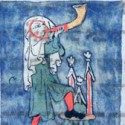
05.09.17 (Iyyar 13, 5777) In the New Testament, the Greek word metanoia (and its related verb, metanao) is the most commonly used word to express the idea of "repentance." The compound word is formed from 'μετα' (after, with) and 'νοεω' (to think) and generally means "changing your mind" (in the noun form) or "thinking differently" (in the verb form). Since it can also represent an "afterthought" expressed emotionally as disappointment over a loss of some kind, metanoia is similar to the idea of nacham (נָחַם) in the Hebrew Scriptures, which literally means to "sigh" as a way of expressing regret or consolation. The Greek word strepho (στρέφω), like the Hebrew word shuv (שׁוּב), means to "return" to God in a practical sense, that is, by performing acts of contrition. In either case, however, a change of direction is implied, and that change ultimately begins with how we think and what we regard as truth. Repentance, then, involves a new vision, a new way of seeing reality...
Yeshua's earthly ministry began with the message, "The time has come and the kingdom of God draws near: repent (μετανοεῖτε) and believe (πιστεύετε) the good news" (Mark 1:15). These two verbs (repent, believe) are in the imperative mood. We are commanded to repent, to "change our thinking," and to turn away from hopelessness - and the sin that hopelessness begets - by accepting God's intervention and deliverance. But you cannot believe if you do not first turn, and therefore you must change your focus: clear away the world's distractions and ready your heart to hear the message. It is in the desert places that we "prepare the way of the Lord and make straight a highway for our God."
קוֹל קוֹרֵא בַּמִּדְבָּר פַּנּוּ דֶּרֶךְ יְהוָה
יַשְּׁרוּ בָּעֲרָבָה מְסִלָּה לֵאלהֵינוּ
kol · ko·rei · ba·mid·bar · pa·nu · de·rekh · Adonai
ya·she·ru · ba·a·ra·vah · me·sil·lah · le·lo·hei·nu

A voice cries out: 'In the desert prepare the way of the LORD;
make straight in the steppes a highway for our God.'
(Isa. 40:3)

Note that the word translated "prepare" (i.e., panu) comes from a root word (פָּנָה) that means to turn to face someone... The Hebrew word panim (פָּנִים), "face," comes from the same root, as does the word penimi (פְּנִימִי), "inner," and the word penimiyut (פְּנִימִיוּת), meaning "inwardness" or "immanency." This suggests that we must go within our own hearts, and there, in our "desert places," we will encounter the Presence of the LORD. It is in the solitude of the desert - away from the noise and distractions of this vain world, where we can focus our heart, confess our sin, and express our great need for God... Being honest with ourselves makes us yashar (יָשַׁר), and crooked ways are made straight for God to be received... The Hebrew word mesilah (מְסִלָּה) alludes to the ladder (i.e., sullam: סֻלָּם) that Jacob saw in the desert when he received the blessing of God (Gen. 28:12). Yeshua is the Bridge, or Ladder (הַסֻּלָּם), that unites and mediates heaven and earth (John 1:51).
Since God holds us responsible to repent and believe the truth of salvation (Acts 17:30-31), God must have made it possible for us to do so ("ought" implies "can"). And indeed, the Lord has created us in the divine image so that we are able to discern spiritual truth. God created us with a logical sense (rationality) as well as a moral sense (conscience) so that we can apprehend order and find meaning in the universe He created. All our knowledge presupposes this. Whenever we experience anything through our senses, for example, we use logic to categorize and generalize from the particular to the general, and whenever we make deductions in our thinking (comparing terms, making inferences, and so on), we rely on logic. We have an innate intellectual and moral "compass" that points us to God.
Because we all necessarily must think in order to live, we should value clear thinking. This should be obvious enough, though people often make various errors and misjudgments because they devalue the effort required to carefully think through a question. As William James once said, "A great many people think they are thinking when they are merely rearranging their prejudices." When it comes to questions about the gospel, however, God regards such carelessness to be blameworthy. Again, the LORD holds us accountable for what we think and believe, especially when it comes to the reality and mission of His Son.
"Truth has always had many loud proclaimers, but the question is whether a person will in the deepest sense acknowledge the truth, allow it to permeate his whole being, accept all its consequences, and not have an emergency hiding place for himself and a Judas kiss for the consequence." - Soren Kierkegaard (1813-1855)
The truth about God is always available to human beings, if they are willing to sincerely look for it. The Divine Light that was created before the sun and the stars represents God's immanent presence that "lights up" all of creation - including our very minds (Gen. 1:3). As Paul stated, "the invisible things of Him from the creation of the world are clearly seen so that people are without excuse" (Rom. 1:19-20). The heavens are constantly attesting to the reality of God's handiwork (Psalm 19:1). All of creation "shouts out" that there is a God. Even small children understand this. People spiritually die because "they refuse to love the truth and so be saved" (2 Thess. 2:10-12). Therefore the issue of truth - physical, moral, aesthetic, spiritual, etc. - is central to salvation itself. For more on this, see "Teshuvah of the Mind."
Perfection and Holiness...
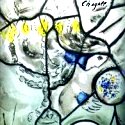
[ The following is related to our Torah reading for this week, Parashat Emor.... ]
05.08.17 (Iyyar 12, 5777) Our Torah portion this week begins by explaining special requirements for Israel's priests, and then goes on to list the yearly cycle of Sabbaths and the seasonal festivals. First of all the priests (kohanim) were required to be "perfect," without any physical defect or uncleanness that might render them unfit for service. Everything about the priests – their clothing, hair style, skin condition, and especially their adherence to the meticulous steps required to offer the daily sacrifice (לֶחֶם אֱלהָיו) - was to be "defect free," and any deviation might incur the penalty of death itself (Lev. 10:2; Num. 4:15, 2 Sam. 6:6-7). On the other hand, what sometimes disqualified a priest were things simply beyond his control, for instance, a variety of physical disabilities such as blindness, having a limp or disfigured limb, and so on (see Lev. 21:16-21).
Thinking about these requirements raises some provocative questions concerning the meaning of "perfection" in our lives, and particularly how we, as a deeply flawed people, can possibly be "perfect." The question is radical and affects how we are to understand practical holiness or the idea of "sanctification": Are we to seek to be perfect people, and if so, how do we understand what this means? Is our spirituality bound up with perfectionism, with flawless performance, and with always being and doing what is right?
In the Sermon on the Mount Yeshua warned that our righteousness should exceed that of the religious leaders of his day (Matt. 5:20), and went on to say: "be perfect, as your heavenly Father is perfect" (Matt. 5:48). Here we note that the Greek word translated "perfect" (τέλειος) may mean "mature" or "fully developed" more than morally flawless, though regarding moral and spiritual practice this distinction is not clear cut, especially if by "mature" we mean godly in character, as the context of Yeshua's statement clearly implies (see Matt. 5:1-48). The Hebrew word translated as "perfect" (תָּמִים) can also mean "complete," but it can connote being "wholehearted," "sound," or even healed (שָׁלֵם). So the question arises, does the word "perfect" mean "flawless" or "healed" -- or perhaps both?
Of course we affirm that God alone is truly perfect (Deut. 32:4; Psalm 18:30), completely good (Matt. 19:17), flawlessly righteous (Psalm 145:17), entirely holy (Isa. 6:3; Rev. 15:4), and peerlessly unique (Exod. 15:11; Jer. 10:6-7), but how can we relate to God's overmastering perfection in the midst of our daily flaws and chronic imperfections? How dare we approach "to offer the bread of God" (Lev. 21:17)?
Followers of the LORD are called to be a "nation of priests," a "select people" (עַם סְגֻלָּה) set apart to serve God in holiness (Exod. 19:5-6; 1 Pet. 2:9; Lev. 11:45), but it is clear we are blemished, imperfect, blind, halt, needy, and unclean... This is common to the human condition: all of us -- Jew or non-Jew alike -- are broken, flawed, and in the midst of the inevitable flow of life that leads to death and decay (Rom. 3:23). We are sick with sin and unable to heal ourselves, and therefore we need a radical transformation - "deliverance from ourselves" – that must come through the miracle of spiritual rebirth (John 3:3,7).
Nevertheless in this world the paradox still remains: we are finite yet long for the undying, the infinite; we are in flux yet anchored in hope; we are a "new creation" yet still saddled with the old nature; we are made holy yet we live in the midst of the profane; we are purified yet still need cleansing; we are healed yet are still wounded; we are redeemed of God yet still need to turn to God in teshuvah; we die daily yet have eternal life. Our hearts are to be a divine sanctuary, yet we are powerless to make God appear in our midst...
Perfection haunts us; we often confuse the ideal and the real. Our romantic visions fail us; all of us are strangers, wanderers, in lonely exile. And the question then becomes – how do we embrace the "already-not-yet," the process, the fleeting days with their poignant moments – within the context of real hope, a vision that heals and brings us real comfort? How do we make peace with our imperfections, our present darkness, and our hunger for deliverance? How do we envision healing in the midst of our brokenness?
For more see: "Perfection and Holiness: Further thoughts on parashat Emor."
You always Speak Twice...

[ The following is related to our Torah reading for this week, Parashat Emor.... ]
05.08.17 (Iyyar 12, 5777) Our Torah portion this week begins, "And the LORD said to Moses, "Speak (אמר) to the priests, the sons of Aaron, and say (וְאָמַרְתָּ) to them..." (Lev. 21:1). Rashi noted that the repeated verb emor (אמר) has a softer tone than the verb dibber (i.e., "speak," as in a command), suggesting almost a pleading quality: "Speak softly again and again..." The repetition suggests that the priests (i.e., teachers who would serve as examples to Israel) shouldn't simply tell people what to do/believe, but rather they should both tell and gently demonstrate Torah truth in their daily lives. When teaching, we are always speaking twice: once to explain and a second time to ignite a passion.... Likewise we study the "Living Torah" by first learning from Yeshua (Matt. 23:8) and only afterward are we commissioned to go "to all the nations and teach" (Matt. 28:19). Such education for eternity impels us to make fellow-learners (disciples), not simply by imparting intellectual doctrine, but by kiddush HaShem -- by sanctifying the LORD in our lives. In this way we are made a "living letter" that is sent into the world that shares the living message of salvation (2 Cor. 3:2-3). But we must first learn the meaning of what we say before we say it...
Note: For more on this subject, see Parashat Emor: Speaking Twice.
Parashat Emor - אמור
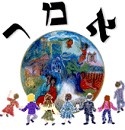
05.07.17 (Iyyar 11, 5777) Our Torah portion for this week (parashat Emor) lists the eight main holidays revealed in the Jewish Scriptures. In the Torah, these "holidays" are called "appointed times" (i.e., mo'edim: מוֹעֲדִים), a word which comes from the Hebrew root meaning "witness" (עֵד). Other words from this root include edah (עֵדָה), a "congregation," edut (עֵדוּת), a "testimony," and so on. The related verb ya'ad (יָעַד) means "to meet," "to assemble," or even "to betroth." The significance of the holy days, then, is for the covenant people of the LORD to bear witness to God's love and faithfulness. As it is written:
כָּל־אָרְחוֹת יְהוָה חֶסֶד וֶאֱמֶת
לְנצְרֵי בְרִיתוֹ וְעֵדתָיו
kol · or·chot · Adonai · che·sed · ve·e·met
le·no·tze·rei · ve·ri·to · ve·e·do·tav

"All the paths of the LORD are love and truth
to the ones guarding His covenant and His testimonies."
(Psalm 25:10)

Hebrew Study Card
Metaphorically the paths of the Lord (orechot Adonai) are likened to ruts or grooves created by the wheels of a caravan (i.e., orechah: ארְחָה) passing repeatedly over the same ground. These paths signify the Divine Presence journeying with God's children in this world. In temporal terms, we are able to discern the path by means of the divine calendar. God's love and faithfulness attend to His covenant (brit) and to the commemorations of the yearly "appointed times" that testify of God's faithful love. Keeping God's testimonies, then, means that we will be careful to observe the holidays in order to witness to God's truth...
"Speak to the people of Israel and say to them, 'These are the appointed times of the LORD (מוֹעֲדֵי יְהוָה) that you shall proclaim as holy convocations (מִקְרָאֵי קדֶשׁ); they are My appointed times'" (Lev. 23:2). Note that these hallowed times - the very first of which is the weekly Sabbath - are "of the LORD," and that means they should be regarded as appointments given by God Himself to help draw us closer to Him, to reveal His prophetic truth, and to remind ourselves of His great plan for our lives.
Passion and Torah...

[ The following is related to our Torah reading this week, parashat Acharei Mot-Kedoshim... ]
05.05.17 (Iyyar 9, 5777) From our Torah portion for this week (i.e., parashat Kedoshim) we read: "You shall therefore keep my decrees and my judgments (chukkot u'mishpatim); if a person does them, he shall live by them: I am the LORD" (Lev. 18:5). This idea is repeated later in the Torah, when Moses admonished Israel: "The whole commandment that I command you today you shall observe and do, so that you may live..." (Deut. 8:1). The Hebrew phrase kol ha'mitzvah (כָּל־הַמִּצְוָה), here translated as "the whole commandment," refers to the heart attitude, or the inner passion of the soul. Some have linked the word "commandment" (מִצְוָה) with the word "connection" (צוותא), suggesting that God's commandments are the means by which we cleave to Him, as is written: "this is the love of God (אַהֲבַת אֱלהִים), that we keep his commandments" (1 John 5:3). The commandments are "for life" (Lev. 18:5), which means they serve as the call of the Beloved to rise to something far greater... The "Whole Commandment," then, is the path of God's love. As it is written, tamim yiyeh im Adonai Elohekha: "You shall be wholehearted with the LORD your God" (Deut. 18:13), and "fear God and keep his commandments - ki zeh kol-ha'adam - כִּי־זֶה כָּל־הָאָדָם - for this is the whole man" (Eccl. 12:13).
We should never imagine that the whole purpose of the Torah is its outer form, but rather the inward meaning. Indeed, the sacrificial blood for our atonement was placed over the tablets of the law (i.e., the blood sprinkled on the kapporet, or the "crown" of the Ark), inside the darkness of the Holy of Holies, just as Yeshua offered up his blood in the dark cloud during his crucifixion (Matt. 27:45-46; Luke 23:45-46). The life is "in the blood," which represents God's passion, the deepest truth of Torah. And this is the message of the gospel itself, of course, since the blood of Yeshua passionately shed for our sake has opened up a new and everlasting way for us to be rightly related to God (Heb. 9:12).
Trusting God's Care...
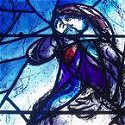
05.05.17 (Iyyar 9, 5777) "Cast your burden upon the Lord, and he will sustain you" (Psalm 55:22). It is important to fully appreciate what this means. When you truly "cast your burden upon the Lord," you are insisting on peace of mind, refusing all worry, and resolving to let go of your anxieties... When you are tempted to consider trouble, when you hear the whisper of fear within, remember to cast your burden upon the Lord and he will sustain you, for "he will never permit the righteous to be moved..." But what of unutterable pain or sorrow? What if you cannot express the burden you carry? Then get alone with God and lay your soul bare: the heart has its own voice regardless of the words we are able to articulate. As it is written: בִּטְחוּ בוֹ בְכָל־עֵת - "Trust in him at all times… pour out your heart before him; God is a refuge for us" (Psalm 62:8). Let not your heart be troubled; be anxious for nothing; believe that God cares for you (1 Pet. 5:7). "Cast your burden upon the LORD (הַשְׁלֵךְ עַל־יְהוָה יְהָבְךָ) and He will sustain you; he will never permit the righteous to be moved."
הַשְׁלֵךְ עַל־יְהוָה יְהָבְךָ
וְהוּא יְכַלְכְּלֶךָ
לא־יִתֵּן לְעוֹלָם מוֹט לַצַּדִּיק
hash·lekh · al · Adonai · ye·hav·kha
ve·hu · ye·khal·ke·le·kha
lo · yit·ten · le·o·lam · mot · la·tzad·dik

"Cast your burden on the LORD,
and He will sustain you;
He will never permit the righteous to be moved."
(Psalm 55:22)

Hebrew Study Card
Waking Up to Reality...

05.05.17 (Iyyar 9, 5777) It's vital to remember that one of the main tactics of the devil is to cast a spell over you to induce a sense of forgetfulness and apathy... The devil wants you to forget that you are a child of the King. The entire venture of teshuvah (repentance) presupposes that you are created b'tzelem Elohim - in the image of God - and therefore you have infinite value and dignity. This is all the more evident in light of the awesome ransom that Yeshua paid to reconcile your soul with God. So what is the greatest sin you can commit in your life? To forget what God has done for you... Remaining asleep, unmindful of your true identity is one of the most tragic things of life. Therefore Rosh Hashanah is sometimes called Yom Ha-Zikaron - the "Day of Remembrance" (Lev. 23:24). The blast of the shofar is meant to jolt us from our sleep... We are to remember who we really are -- to remember that God is our King. The person who says, "Tomorrow I will do teshuvah" really is saying, "Not now." And then tomorrow comes and he says, "Not now." And in this way his entire life passes by, saying, "Not now." Finally one day he wakes up only to find himself already dead. May God help us wake up to the Reality that is set before us.
Renewing your Mind...
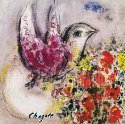
05.05.17 (Iyyar 9, 5777) The Scriptures counsel us to be transformed by "renewing our minds" (Rom. 12:2), though how we are to do this remains an open question. Our perspectives and attitudes are shaped by our assumptions about life, many of which are "preconscious" or hidden from our awareness. Habitual thoughts, biases, prejudices, fears, etc., all affect (and distort) the way we see and understand reality. In light of this, how can we change? How can we overcome our habitual negativity, misery, and general unhappiness? How do we develop right thinking power? How do we learn to apply our minds to perceive the good, instead of responding in unreflective and negative ways to our circumstances? How do we discipline our will so that "if there is anything worthy of praise, think about these things" (Phil. 4:8)?
There are innumerable books on the subject of logic, detecting fallacies, and using sound reasoning techniques, but there are not many that discuss the "morality" of our thinking, that is, our God-given responsibility to perceive the truth and to consistently express it in our everyday actions. Since our thinking invariably leads to practical choices, we have a primary duty to know the truth and live out its implications in our lives. The failure to do so is not only inconsistent, logically speaking, but immoral, ethically speaking (and dangerous, spiritually speaking, since bondage is ignorance of the truth). If the truth bears witness that there is a personal God who creates each soul in the world, for instance, this should affect how we value and respect others, and the failure to do so will result in cognitive dissonance and internal contradiction that yields mental suffering, misery, emotional pain, and insecurity in our lives. A "double-minded" person is "two-souled" (δίψυχος), unstable (i.e., ungrounded, restless, unbalanced) in all his ways (James 1:8).
Healing comes from receiving the light of truth, being "single-minded," with our eye focused on what is real. "If your eye is "single" (i.e., ἁπλοῦς, sincere, focused)," Yeshua said, "your whole body will be filled with light" (Matt. 6:22). Likewise the Torah commands: "You shall be made whole (i.e., tamin: תָּמִים) with the LORD your God" (Deut. 18:13). We are made "whole" or "perfect" (i.e., complete) when we resolutely turn to God for healing of our inner dividedness, as it says: "The Torah of the LORD is perfect (תָּמִים), returning the soul" (Psalm 19:8). And where it is written, "Let us hear end of the matter: Fear God and love his commandments, the text adds: ki zeh kol-ha'adam (כִּי־זֶה כָּל־הָאָדָם), "for this is the whole man," suggesting that those who return will be healed of double-mindedness (Eccl. 12:13). Ultimately we are made whole when we are united to God in Messiah, for then we are "with the LORD our God" and the Spirit writes Torah within the heart of faith (Jer. 31:33).
The heart of truth sees beyond the present to find meaning in the Eternal, yet it refocuses on the present to endow it with sacred significance... "Love hopes all things" (1 Cor. 13:7). To rightly see the present moment, in other words, we must first look to the Eternal, since that grounds our perspective and contextualizes our hope: "For this light momentary affliction is preparing for us an eternal weight of glory beyond all comparison, as we look not to the things that are seen but to the things that are unseen. For the things that are seen are transient, but the things that are unseen are eternal" (2 Cor. 4:17-18).
Regard this as a prophecy for your life: "You shall be made whole with the LORD your God." God's love heals the inner brokenness of our hearts. When we accept this, we discover that surrendering to God's will truly makes us "whole." "As many as I love, I reprove and correct: be zealous therefore, and turn. Listen! I stand at the door and knock. If anyone hears my voice and opens the door I will come into his heart and share a meal with him, and he with me" (Rev. 3:19-20). These are words of our Lord Yeshua, who speaks to those who "hear his voice." May you open the door of your heart; may you return to Him now...
Keeping a Joyful Focus...

05.05.17 (Iyyar 9, 5777) We are to take "every thought captive" to the truth of Messiah (2 Cor. 10:5). Practically speaking, this means that whenever you "catch yourself" thinking a negative thought, you reject it instantly and turn your attention to the Presence of God. As King David said, שִׁוִּיתִי יהוה לְנֶגְדִּי תָמִיד - "I have set the Lord always before me" (Psalm 16:8). This is the first act of will that opens the "path of life" (ארַח חַיִּים) and discovers the place (הַמָּקוֹם) of fullness of joy (Psalm 16:11). Make the decision to believe, friend. This is not too difficult for you, neither is it far off, "for the matter is very near you; it is in your mouth and in your heart, so that you can do it" (Deut. 30:14).
שׁויתי יהוה לנגדי תמיד
כי מימיני בל־אמוט
shiv·vi·ti · Adonai · le·neg·di · ta·mid
ki · mi·mi·ni · bal · e·mot

"I have set the LORD always before me;
because he is at my right hand, I shall not be shaken"
(Psalm 16:8)

Hebrew Study Card
The devil's strategy is as banal as it is tedious, namely, to entice us to forget the truth of God and to live in a state of virtual exile and pain. Therefore Shema - listen and remember - is the basic commandment. Since the LORD is the Center of all that is real, to become anxious is to "practice the absence" of God's presence instead of practicing His Presence. We have to remember the future, as well as the present and past....
Rejoicing in Hope...

05.05.17 (Iyyar 9, 5777) "Rejoice in the Lord always, and again I say rejoice" (Phil. 4:4). In this world, such praise is truly countercultural, radical, and in defiance of all worldly mockery, scorn, fear and despair... The heart of faith affirms that, "whether we live or whether we die, we are the Lord's" (Rom 14:8), and the Lord has given us the cheer of victory (נִצָחוֹן), the song of life (שיר החיים) that rises above the despondent clamor of this moribund world, the sacred triumph over all the powers of sin and death (1 Cor. 15:57). Rejoice, friends, because we are healed – eternally and everlastingly – by the love of God that frees us from our sins and bestows upon us a never-ending and all-consuming grace. כּל הַנְּשָׁמָה תְּהַלֵּל יָהּ הַלְלוּ־יָהּ – "Let everything that has breath praise the LORD! Praise the LORD" (Psalm 150:6).
Deliverance from Ourselves...
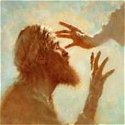
05.04.17 (Iyyar 8, 5777) We all struggle with sin in our lives, and each of us needs deliverance from various attachments and fears that keep us from the deeper life... The problem is within ourselves, that is, the contradiction of heart we experience in our double-mindedness, our ambivalence, and our unbelief (Jer. 17:9). We may recite the Shema every day and say that we love God with all our being, but in the ordinary moments of daily life we are drawn to other concerns, alien affections, other "gods." Indeed, whatever matters most to us, whatever consumes our attention, time, resources, and our interest, is something we "worship," that is, something we esteem as worthy and valuable... People necessarily value things, and therefore every person alive is a "worshiper" (i.e., a person who finds "worth" in something). This applies equally to a devout atheist or pious skeptic as much as it does a deeply religious person... The question that matters, however, is what is your ultimate concern? What do you really want? Only when we begin to understand what draws and attracts us can we begin to discern what we really need. Therefore we must first acknowledge our false worship, our radical selfishness, and our sundry attachments in order to be set free. We must confess the truth that we are slaves. Pride blinds us to the truth of our sickness of heart, persuading us to deny our problems, to cover them up, and to try harder and harder to "control" ourselves. This is a spiritual dead-end, a vicious circle, the "law of sin and death." We are set free, however, when we die to ourselves, that is, when we surrender to the love of God and receive the miracle of deliverance. Since we are powerless to change ourselves, to reform our lower nature, and to be healed by our own best efforts, we must abandon our "religion" and rely entirely upon God for the power to heal. This is an ongoing venture: We die daily; we take up the cross daily, we walk with a limp from our inner struggle, and we cling to God alone to guide our steps. Beloved, we have been crucified with Messiah and the old nature has lost its power over us; we are alive by the miracle of God's power. "If we live by the Spirit, let us also walk in the Spirit" (Gal. 5:25).
לא בְחַיִל וְלא בְכחַ
כִּי אִם־בְּרוּחִי
אָמַר יְהוָה צְבָאוֹת
lo · ve·cha'·yeel · ve·lo · ve·kho'·ach
kee · eem-be·roo·chee
a·mar · Adonai · tze·va·oht

"Not by might, nor by power,
but by my Spirit,
says the LORD of hosts." (Zech. 4:6)
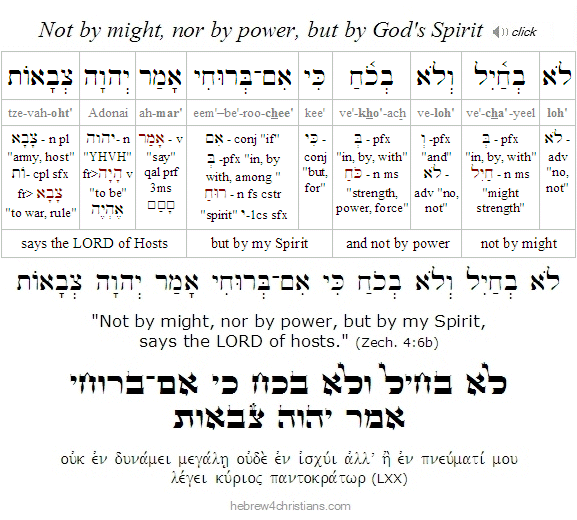
Footsteps of the Messiah...
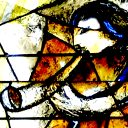
05.04.17 (Iyyar 8, 5777) Yeshua forewarned of the alienation and moral sickness that would pervade mankind just before the time of his return: "Because lawlessness (i.e., ἀνομία, from -α ('not') + νομος, 'torah') will be increased," he said, "the love of many will grow cold (i.e., ψύχομαι, 'be extinguished')" (Matt. 24:12). Note the link between Torah and love: true love requires respect for God's authority, for without that the divine image is disfigured and desecrated. Likewise the Apostle Paul foresaw that the "End of Days" (אַחֲרִית הַיָּמִים) would be a time of peril (καιροὶ χαλεποί) because people would become increasingly narcissistic, self-absorbed, infatuated with their own sense of self-importance, abusive toward others, disrespectful to elders, ungrateful, heartless, unforgiving, without self-control, brutal, treacherous, and so on (2 Tim. 3:1-4). Therefore, in light of the spiritual war that rages all around us, it is vital that we remain firmly rooted in what is real by taking hold of our identity and provision as children of God. "God has not given us the spirit of fear, but of power (גְּבוּרָה / δύναμις) and of love (ἀγάπη), and of a "sound mind" (σωφρονισμός), i.e., a "delivered" mind, "healed" from fragmentation (2 Tim. 1:7). The name of the LORD (יהוה) means "Presence," and in Him we live and move and have our being (Acts 17:28). He is as close as our heart and our very breath (Rom. 10:8). We are not to be troubled like the world that lives in terror of man, nor are we to crave security from the vain devices of mere men. No - we must look to God Almighty, the Master of the Universe. He alone is our Refuge and Defence, the One who gives us steadfast love in the midst of these storms.
Ikvot HaMashiach - עִקְּבוֹת הַמָּשִׁיחַ
According to Jewish eshcatological tradition, the period of time immediately before the Messiah's arrival is sometimes called ikvot meshicha (עִקְּבוֹת מְשִׁיחַ), the time when the "footsteps of the Messiah" can be heard. Some of the "signs" of this period include the rise of various false prophets, numerous wars and "rumors of wars" (including the rise of Magog), famines, earthquakes, worldwide apostasy from the faith, persecution, and a globalized sort of godlessness that is revealed in unbridled selfishness, greed, chutzpah (audacity), shamelessness, and a general lack of hakarat ha-tov (gratitude). The greatest sign, however, will be that Israel will exist once again as a sovereign nation, despite the prophesied exile among the nations (Deut. 4:27-31; Jer. 30:1-3). According to some of the sages, the 9th century work Pirkei d'Rabbi Eliezer foretells that just before the coming of Messiah, "Ishmael" will rise in power to terrorize the world. According to Yalkut Shimoni, the king of Persia (Iran) is going to "have a weapon that is going to terrorize the world." A coming "Messiah of evil" (code name Armilus) will soon appear on the world stage to offer a peace treaty for Israel and the Middle East, "but when they shall say, 'peace and security' (confirmed covenant) then sudden destruction will come upon them, as labor pains come upon a pregnant woman (time of Jacob's Trouble), and they will not escape (1 Thess. 5:3).
 |
Note: For more on this subect, see the article "Birthpangs of Messiah" and its related links.
Our Duty to Truth...

05.03.17 (Iyyar 7, 5777) We are "epistemologically" responsible to walk in the Spirit of truth and to reject what is false (1 John 4:6). This implies that we have a moral and spiritual duty to think clearly and not abuse our minds (Phil. 4:8; Rom. 12:2). God made us so that we could discern truth about reality. The mind functions according to logical laws because it is made in the image and likeness of God Himself... God Himself is the ground of all logic, since He created reality and structured the world to be knowable according to its laws. As it is written: "In the beginning was the word/logic (ὁ λόγος), and the λόγος was with God, and the λόγος was God" (John 1:1). God created a world that exhibits order and great beauty. And since human beings were created b'tzelem Elohim, in the image of God, our thoughts (and the words used to formulate our thoughts) as well as our actions are intended to exhibit order and beauty. People perish because "they refuse to love the truth and so be saved" (2 Thess. 2:10-12). Therefore the issue of truth - physical, moral, aesthetic, spiritual, etc. - is central to salvation itself.
Since the use of language presupposes the laws of logic, every utterance we make is grounded in transcendental meaning and significance (Psalm 19:2-3).... In the world to come you will be shocked to understand that everything you thought, everything you said, and everything you did was given to you from above, and therefore has tremendous significance. "Let the words of my mouth and the meditation of my heart be acceptable in your sight, O LORD, my rock and my redeemer" (Psalm 19:14).
יִהְיוּ לְרָצוֹן אִמְרֵי־פִי
וְהֶגְיוֹן לִבִּי לְפָנֶיךָ יְהוָה צוּרִי וְגאֲלִי
yi·he·yu · le·ra·tzon · im·rei · fi
ve'heg·yon · lib·bi · le·fa·ne·kha · Adonai · tzu·ri · ve'go'a·li

"Let the words of my mouth and the meditation of my heart be acceptable to You,
O LORD, my rock and my redeemer."

Hebrew Study Card
May it please God to help us use our words for the purpose of strengthening and upbuilding (οἰκοδομὴν) one another (Eph. 4:29). May our words always be gracious and "seasoned with salt" (Col. 4:6). Dear Lord, awaken our hearts. As it is written: "Whoever keeps His word, in him truly the love of God is perfected" (1 John 2:5).
Note: For more on this vital topic see the articles: Teshuvah of the Mind, and The Importance of Truth: Teshuvah and Moral Courage.
Battle Against the Lie...
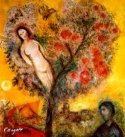
[ The following is related to our Torah reading this week, parashat Kedoshim... ]
05.03.17 (Iyyar 7, 5777) Our Torah portion this week (i.e., parashat Kedoshim) includes the statement, Lo ta'amod al dam re'ekha: "You must not stand idly by when your neighbor's life is at stake" (Lev. 19:16). The principle of lo ta'amod (לא תַעֲמד) means that we have a moral duty to speak the truth when others are victimized. "Standing idly by" can therefore mean refusing to come forward with the truth about a situation from fear of the consequences, but it can also mean excusing the sin of our culture and of our friends. "A truthful witness (עֵד אֱמֶת) rescues lives, but the one who breathes lies (יָפִחַ כְּזָבִים) brings deception" (Prov. 14:25). As it is written, "You shall not spread a false report. You shall not join hands with a wicked man to be a malicious witness (עֵד חָמָס)" (Exod. 23:1). It is the truth that sets people free to serve God, but this presupposes the ability to discern how we all become enslaved to deception. "You are to distinguish between the holy (i.e., ha-kadosh: הַקּדֶשׁ) and the common (i.e., ha-chol: הַחל), and between the unclean (i.e., ha-tamei: הַטָּמֵא) and the clean (i.e., ha-tahor: הַטָּהוֹר)" (Lev. 10:10, see also Ezek. 44:23). Just as God separated the light from the darkness (Gen. 1:4), so we are called to discern between (בֵּין) the realms of the holy and the profane, the sacred and the common, and the clean and the unclean. Indeed, the Torah states "God called the light Day, and the darkness he called night," thereby associating His Name with the light but not with the darkness (Gen. 1:5). "For you all are sons of the light and sons of the day. We are not of the night nor of the darkness" (1 Thess. 5:5). We are instructed therefore to wear the "armor of light" (Rom. 13:12) and to be equipped to wage spiritual warfare in God's Name (Eph. 6:11-18).
"For this reason I was born, and for this reason I came into the world - to testify to the truth. Everyone who belongs to the truth listens to my voice" (John 18:38). The people of God are the people of truth! For more on this topic, see "Parashat Kedoshim: Battle Against the Lie."
Love and Reproof...

[ The following is related to our Torah reading this week, parashat Acharei Mot-Kedoshim... ]
05.03.17 (Iyyar 7, 5777) In our Torah portion this week there is a wonderful verse (Lev. 16:16) which states that the LORD "dwells with them in the midst of their contamination" (הַשּׁכֵן אִתָּם בְּתוֹךְ טֻמְאתָם). Even though the people were unclean (i.e., defiled by sin and tumah), the Divine Presence was not removed and the means for reconciliation were provided... Aren't you glad that the love of God doesn't "stop there" (i.e., with a verdict about our sinful condition) but goes beyond the offense to provide remedy and hope?
Yeshua said, "Where two or three are gathered in my name, there I AM in the midst of them" (Matt. 18:20). This is expressed by the Hebrew word for love (i.e., ahavah: אהבה), the gematria of which is thirteen, but when shared with another is multiplied: 13 x 2 = 26 -- the same value for the name of the LORD (יהוה). The commandment, "you shall love your neighbor as yourself" (וְאָהַבְתָּ לְרֵעֲךָ כָּמוֹךָ) thus awakens in the other the same kind of love for you -- and the result will be a "double love" -- or the love of God (אַהֲבַת הָאֱלהִים). Of course this isn't easy, but immediately after giving the commandment, God declares: "I AM the LORD" (אֲנִי יְהוָה), which the sages traditionally interpret to mean, "I, the LORD, will help you fulfill this commandment if you sincerely wish to do so."
For more on this topic, see the Torah article "Love and Reproof."
Respect Precedes Torah...
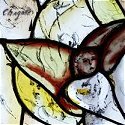
05.02.17 (Iyyar 6, 5777) A fundamental axiom of the "godward life" may be summarized as "respect precedes Torah" (דרך ארץ קדמה לתורה), which means that we must esteem ourselves and others properly as image bearers of God. This is foundational to all else. We must first care; we must be willing to give up our sickness; we must want to be healed. This also means that we are willing to give up blaming others and confess the truth about how we have brought pain to our lives. After we learn to forgive ourselves, we can let go of the pain, the weary anger, and forgive others of their missteps, too. It is impossible to be joyful apart from such humility. Therefore each of us must rebuff demonic impulses and turn to God for healing. And we must beseech the Lord to help us stay awake and to resist being lulled back into the unconsciousness of the world and its delusions.
Holiness and Sanity...

05.02.17 (Iyyar 6, 5777) The call to live a holy, separate life before the LORD requires that we are imbued with the truth of God, and that implies that we will attend to the Torah and its meaning for our lives. We are living in stressful times, chaverim. Indeed, the Apostle Paul wrote that the time before the "End of Days" would be "perilous" (χαλεπός) and full of human depravity (2 Tim. 3:1-5). In light of the raging spiritual war going on all around us, the following needs to be restated: "The important thing is to not lose your mind..."
The mind is the "gateway" to your heart, and therefore it is essential to guard your thinking by immersing yourself in the truth. Fear is often the result of believing the lie that God is not in control or is unable/unwilling to help you... "Not losing your mind" therefore means being grounded in what is real, and it therefore means understanding your sacred identity and blessing as a child of God. "God has not given us the spirit of fear, but of power (גְּבוּרָה / δύναμις) and of love (ἀγάπη), and of a "sound mind" (σωφρονισμός), lit. a "delivered" mind, "healed" from fragmentation (2 Tim. 1:7). The Greek word "sound mind" (σωφρονισμός) comes from the verb sodzo (σῴζω), meaning "to save," from saos (σάος) "safe," in the sense of being under restraining influence of the Spirit of God...
If you are afraid of man, understand that this comes not from the Spirit of God, but rather from the enemy of our souls... God is as close as your heart and mouth, and therefore we stand in His Presence, and we must live in awe of Him... We are not to be like the world that lives in terror of man, lusting after security from the vain devices of mere men. No - look to the LORD God Almighty, the Master of the Universe.... "What I tell you in the dark, say in the light, and what you hear whispered, proclaim on the housetops. And do not fear those who kill the body but cannot kill the soul. Rather fear Him who can destroy both soul and body in hell" (Matt. 10:27-28).
Time is nearly up for this world, and the hour draws near: "The nations rage, their kingdoms totter; He utters his voice, the earth melts. Adonai Tzeva'ot imanu - the LORD of hosts is with us; our fortress is the God of Jacob. Selah" (Psalm 46:6-7). If you were to die tonight, what would happen to your eternal soul? Are you certain of your acceptance before the Father, and if so, on what basis? There is a way that seems right - even for the professing Christian. We are admonished to "enter by the narrow gate; for the gate is wide and the way is easy that leads to destruction, and those who enter by it are many" (Matt. 7:14).
Among other things, a life of faith is a form of protest against any reality that excludes the Divine Presence of Yeshua, God's redemptive love... Because of this, faith expresses a kind of temporal unhappiness or longing for the ultimate healing of all.... מָרַן אֲתָא - Maranatha!
Note: For more about the relationship between Passover and Yom Kippur, see the article entitled, Yom Kippur and the Gospel.
Spelling out "Repentance"

[ The following is related to our Torah reading this week, parashat Acharei Mot-Kedoshim and our divine responsibility to love others as we love ourselves... ]
05.02.17 (Iyyar 6, 5777) Rabbi Sussya of Anipol once said: "There are five verses in the bible that constitute the essence of the Torah. These verses begin in Hebrew with one of these letters: Tav (תּ), Shin (שׁ), Vav (ו), Bet (בּ), and Hey (ה), which form the word for repentance, "teshuvah" (תְּשׁובָה). The five verses are 1) Tamim tiheyeh (תָּמִים תִּהְיֶה): "Be wholehearted before God" (Deut. 18:13); 2) Shiviti Adonai (שִׁוִּיתִי יְהוָה): "I have set the LORD always before me" (Psalm 16:8); 3) Va'ahavta lere'akha (וְאָהַבְתָּ לְרֵעֲךָ): "Love your neighbor as yourself" (Lev. 19:18); 4) Bekhol derakekha (בְּכָל־דְּרָכֶיךָ): "In all your ways know Him" (Prov. 3:6); and 5) Higid lekha (הִגִּיד לְךָ): "Walk humbly with your God" (Micah 6:8). In other words, the way of teshuvah, of answering God's call for you to return to Him, is to sincerely set the LORD before you, to love others, and to walk out your days in heartfelt gratitude.
הִגִּיד לְךָ אָדָם מַה־טּוֹב
וּמָה־יְהוָה דּוֹרֵשׁ מִמְּךָ
כִּי אִם־עֲשׂוֹת מִשְׁפָּט וְאַהֲבַת חֶסֶד
וְהַצְנֵעַ לֶכֶת עִם־אֱלהֶיךָ
hig·gid · le·kha · a·dam · mah · tov
u'mah · Adonai · do·resh · mi·me·kha
ki · im · a·sot · mish·pat · ve·a·ha·vat · che·sed
ve·hatz·ne·a · le·chet · im · e·lo·hey·kha

"He has told you, O man, what is good, and what the LORD requires of you:
Only to do justice, and to love kindness, and to walk modestly with your God"
(Micah 6:8)

Hebrew Study Card
In other words, "teshuvah" (repentance) may be seen as an acronym that stands for being wholehearted, seeking God, loving others, knowing God in all your journey, and walking in humility. May the LORD our God impart the miracle of teshuvah to each of us today....
The Heart of Atonement...

[ The following is related to our Torah reading this week, parashat Acharei Mot... ]
05.01.17 (Iyyar 5, 5777) Most of our deepest anxieties come from the fear of death, whether we are conscious of this or not... Death represents fear of the unknown, fear of being abandoned, fear of being rejected, fear of being separated from others, and so on. I am so glad Yeshua gives us eternal life, which for me is not so much about immortality of the soul as it is being loved and accepted by God... That is what "at-one-ment" means, after all (John 17:22-23). Because God loves and accepts us, we trust Him to be present for us, even in the darkest of hours, on the other side of the veil, where he there "prepares a place for us" (John 14:2). As Yeshua said, "I tell you the solemn truth, the one who hears my message and believes the One who sent me has eternal life (חַיֵּי עוֹלָם) and will not be condemned, but has passed (i.e., μετά + βαίνω, lit., "crossed over" [עָבַר]) from death to life" (John 5:24). God's love "crosses over" from death to life and now forever sustains me.
Our Torah reading for this week (Acharei Mot) provides details about Yom Kippur, or the "Day of Atonement," a special service that gave ritual expression of God's love by making purification for our sins. As I've explained before, the word for love (i.e., ahavah: אהבה) equals the number thirteen (1+5+2+5=13), but when shared it is multiplied: 13 x 2 = 26, which is the same value for the Sacred Name (יהוה), i.e., (10+5+6+5=26). Likewise the Hebrew word for "life" is chayim (חַיִּים), is written in the plural to emphasize that life cannot be lived alone but must be shared. Notice that within the word itself are embedded two consecutive Yods (יי), representing unity in plurality (Yod-Yod is an abbreviation for YHVH, also indicating the "deep Akedah" of Father and Son). God gave up His life so that we can be in relationship with Him, that is, so that we can be "at-one" with His heart for us. Whatever else it may mean, then, the Hebrew word for "atonement" (i.e., kapparah, "covering," "protection," "purification," "forgiveness") is about accepting God's heart for you - being unified in his love - and if you miss that, you've missed the point of the Torah's teaching....
The Goal of Holiness...

[ The following is related to our Torah reading this week, parashat Acharei Mot-Kedoshim... ]
05.01.17 (Iyyar 5, 5777) "Be holy as I am holy" (Lev. 19:2). This doesn't mean wrapping yourself up in some protective cloak of religious rituals as much as it means accepting your own atonement: reconciling who you are with your past, finding healing and love, and walking in genuine hope... Holiness isn't as much "separation" from the profane as it is "consecration" to the sacred, and in that sense it is a kind of teshuvah, a turning of the heart back to reality.... Negatively put, "being holy" is turning away from fear, despair, and anger; positively put, it is embracing the worth and value of life, respecting the Divine Presence, and walking in the radiance of God's love. Hashivenu Adonai....
|


